Tips and how to travel to Saudi Arabia in 2023
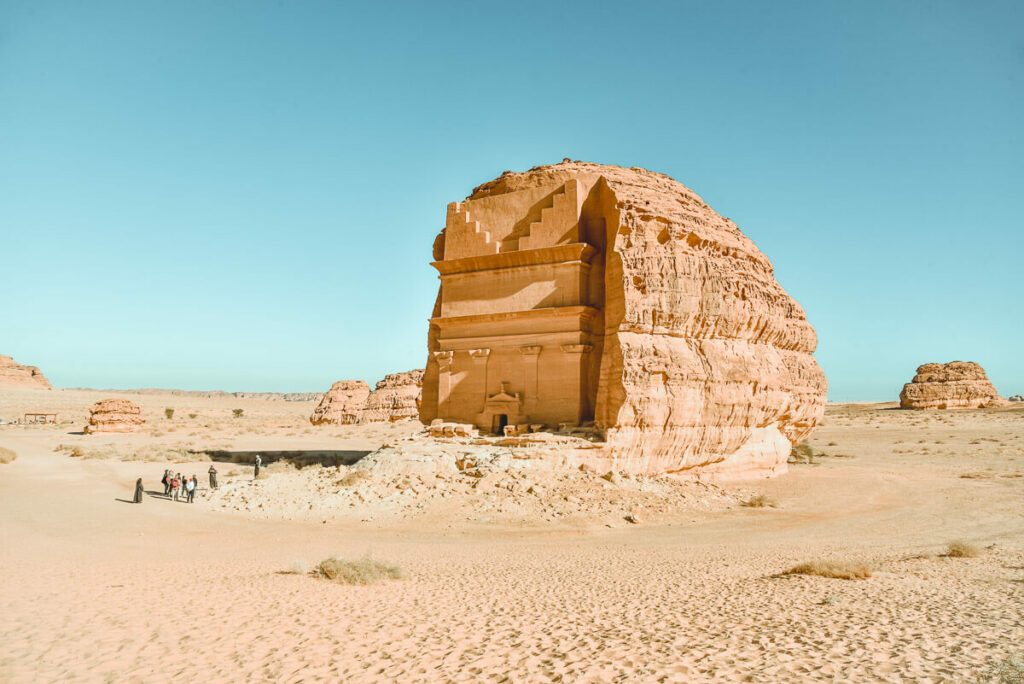
Once one of the most difficult countries to visit, Saudi Arabia is finally issuing visas for tourism purposes and independent travel.
Before, the only way to travel to Saudi was on a business visa, via a strong local connection who could sponsor your visit, or by getting a pilgrimage visa to visit Mecca and Medina (only for Muslims).
Therefore, the fact that all of a sudden, Western tourists can visit Saudi Arabia on their own, with a backpack, both men and women, is a very radical change.
This incredibly big change, however, didn’t come alone.
During the last couple of years, a lot of their super strict Islamic laws have been softened or, at least, they have become more flexible. For example, allowing women and men to hang out together in public spaces was one of the most significant changes.
All these small changes will make things easier for future international visitors.
Despite everything that you may have read in the media, Saudi Arabia is an incredible country. There is just so much to do and see, a country filled with loads of stunning sites, both natural and archaeological, hugely contrasting landscapes and some extremely hospitable people that could easily rival my beloved friends from Afghanistan, Pakistan and Iran.
I strongly believe that this is the most underrated country on this planet, and here I have compiled a comprehensive travel guide to Saudi Arabia packed with tips and everything you need to know to travel to the Kingdom.

In this Saudi Arabia travel guide you will find:
COVID-19 travel restrictions
Visa
Travel Insurance
Best time to visit
Top experiences
Getting to Saudi
Tourism in Saudi Arabia
Is it ethical?
Blocked websites
How to behave
Saudi people
The food
Solo female travel
Safety
Money
Moving around Saudi
Internet and SIM Card
Accommodation
More information
In Saudi Arabia, the internet is censored, which means that some websites and internet services are blocked. If you want to access them you will need a VPN and for that, I recommend ExpressVPN, the fastest and works best for Saudi.
CLICK HERE TO LEARN MORE ABOUT ExpressVPN
COVID-19 travel restrictions for Saudi Arabia
COVID-19 travel requirements for visiting Saudi Arabia were lifted.
How to get a visa for traveling to Saudi Arabia
For visiting Saudi, you can either apply for an e-visa or get a visa on arrival.
Which countries are eligible to visit Saudi with tourist e-visa?
All EU countries + Andorra, Iceland, Liechtenstein, Monaco, Montenegro, Norway, San Marino, Switzerland, United Kingdom, and Australia, Brunei, Canada, China, Japan, Kazakhstan, Malaysia, New Zealand, Russia, Singapore, South Korea, Ukraine and the United States,
How to apply for Saudi tourist e-visa
You can easily apply for it through visitsaudi.com
This is what the tourist visa for Saudi looks like.
Just follow the steps, and you will be on the way.
How much does the Saudi e-visa cost?
The total visa price is 535 Saudi Rials, which is around 142 US Dollars.
From that amount, 180 Saudi Rials refer to the Saudi travel insurance, a COVID-related requirement.
How long is it valid for?
The visa allows you to stay in Saudi for 90 days, and it has a 1-year validity from the issuance date.
It’s also valid for multiple entries.
This means that, within a year, you travel to Saudi as many times as you want with the same visa, as long as your stay doesn’t exceed more than 90 days.
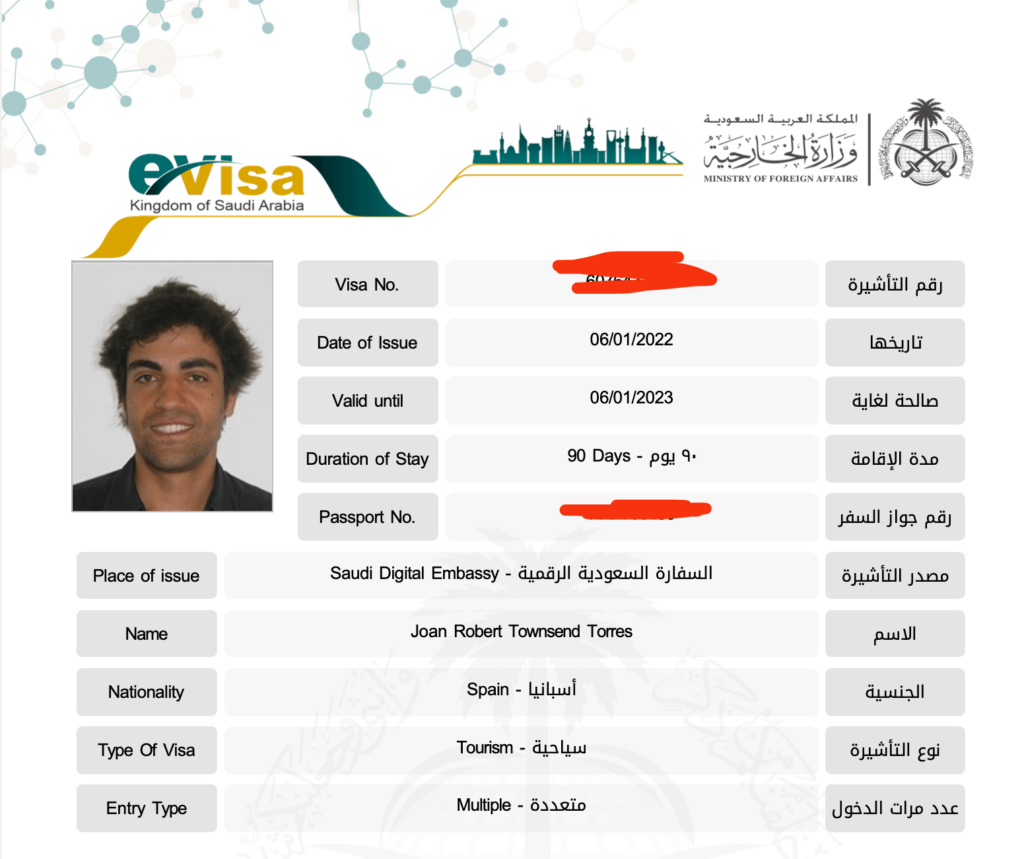
How to get a visa on arrival (VOA) for Saudi Arabia
In 2023, they also introduced a VOA regime, valid for any entry port into Saudi Arabia.
The VOA on arrival costs 300 Saudi Rials, but they also make you buy travel insurance, which costs an additional 180 Saudi Rials.
The total cost is 480 SR, cheaper than the e-visa.
As of today, nobody understands why should someone go through the hassle of applying for an e-visa, when the VOA costs 55 SR less.
Can single women apply for a Saudi visa?
Yes, they certainly can, no restrictions for being a female.
What about the rest of the nationalities, can they travel to Saudi?
Actually, yes, they can.
A fellow traveler with an Argentinian passport told me that she applied at the embassy in Buenos Aires and managed to get her visa in only 1 week.
She had to present things like a payslip, vaccines, return flight ticket, and things like that.
Also, travelers with valid US and Schengen visas – and that includes Indian and Pakistani citizens – can also get a visa for Saudi on arrival.
Don’t forget to read my 2-week itinerary in Saudi Arabia.
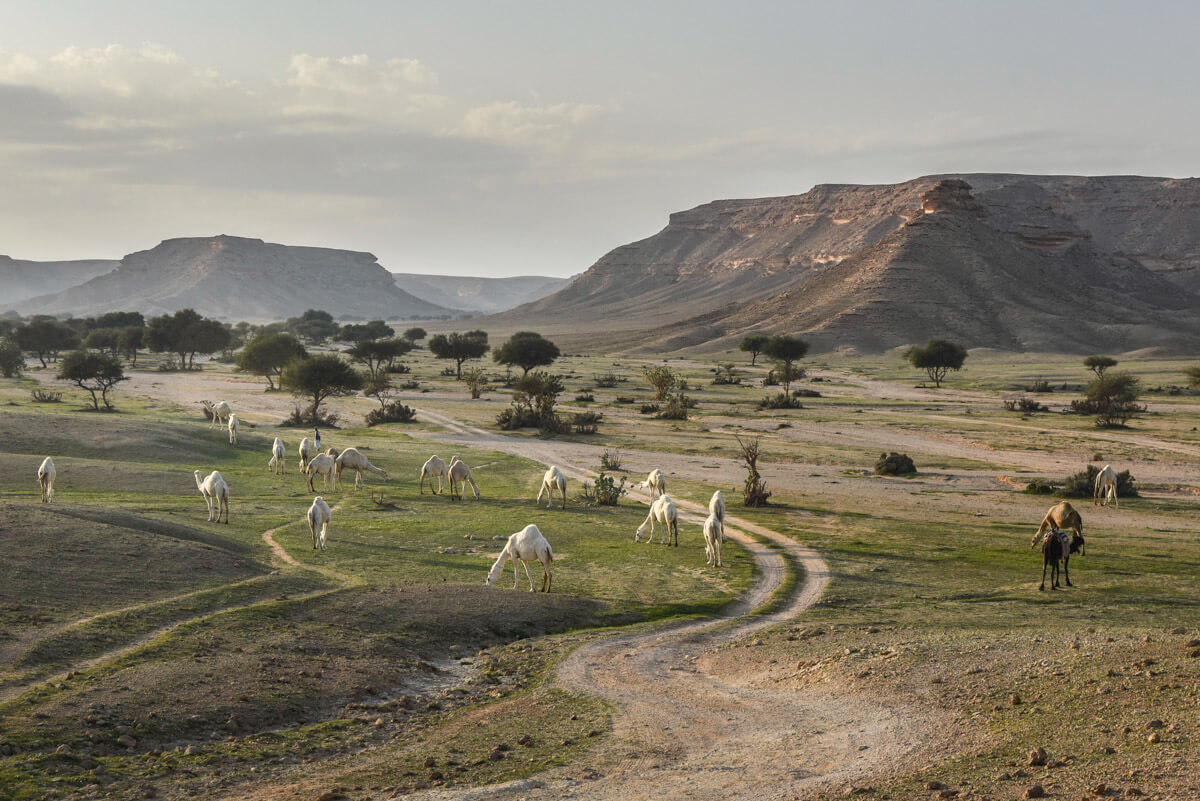
Get this epic travel guide to Saudi Arabia!
My friends Sian & Bob have recently published a full guidebook to Saudi Arabia, containing loads of actionable advice and a great overview of each one of their regions. A great introduction to the country, this must be the only available travel guide to Saudi Arabia!
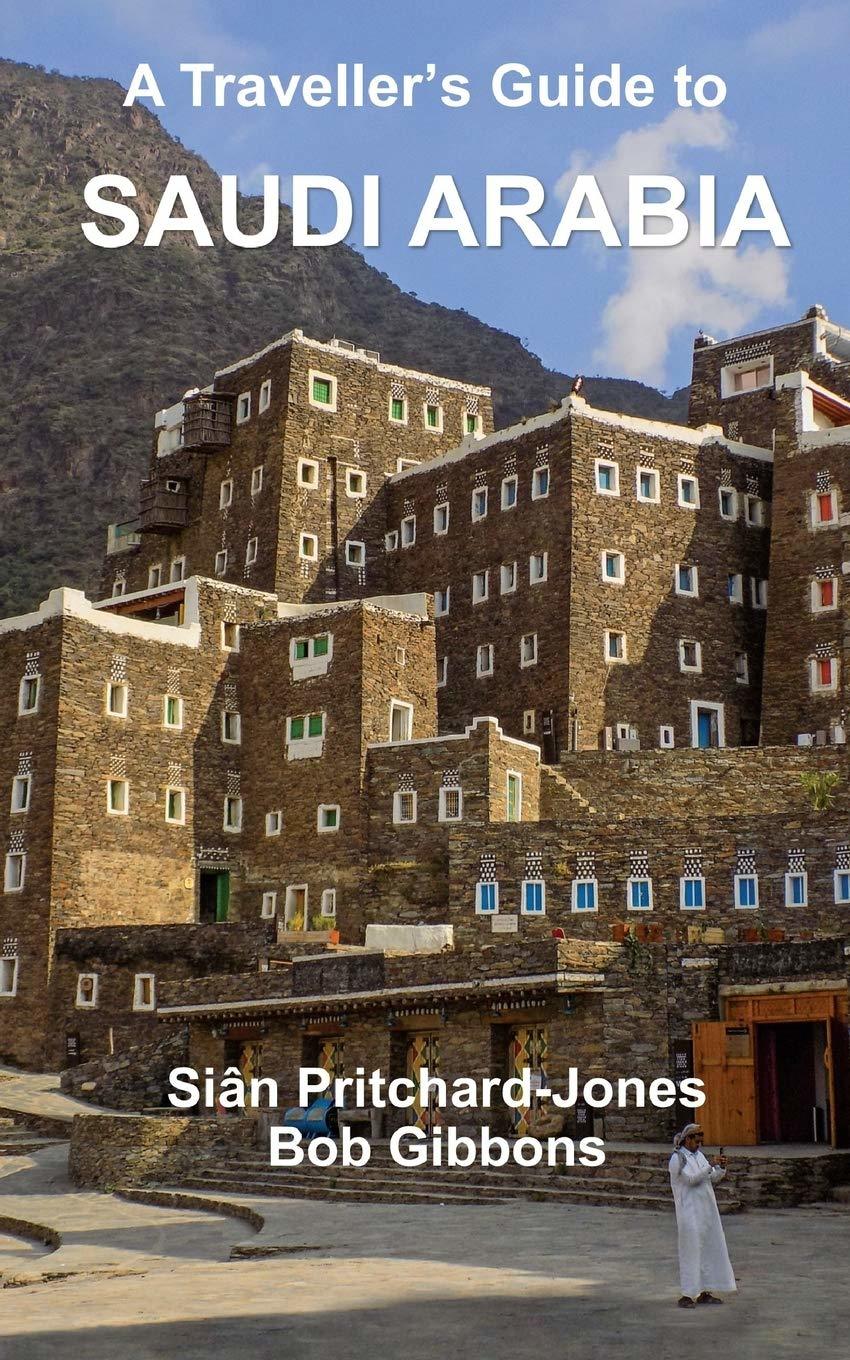
Travel Insurance for Saudi Arabia
In Saudi Arabia the Health Care System is private and crazy expensive, so do get proper travel insurance. I strongly recommend IATI Insurance because:
- It covers up to 5 million € of medical expenses
- One of the few providers with full COVID-19 coverage
- Covers senior citizens too
- Readers of this blog can get a 5% exclusive discount
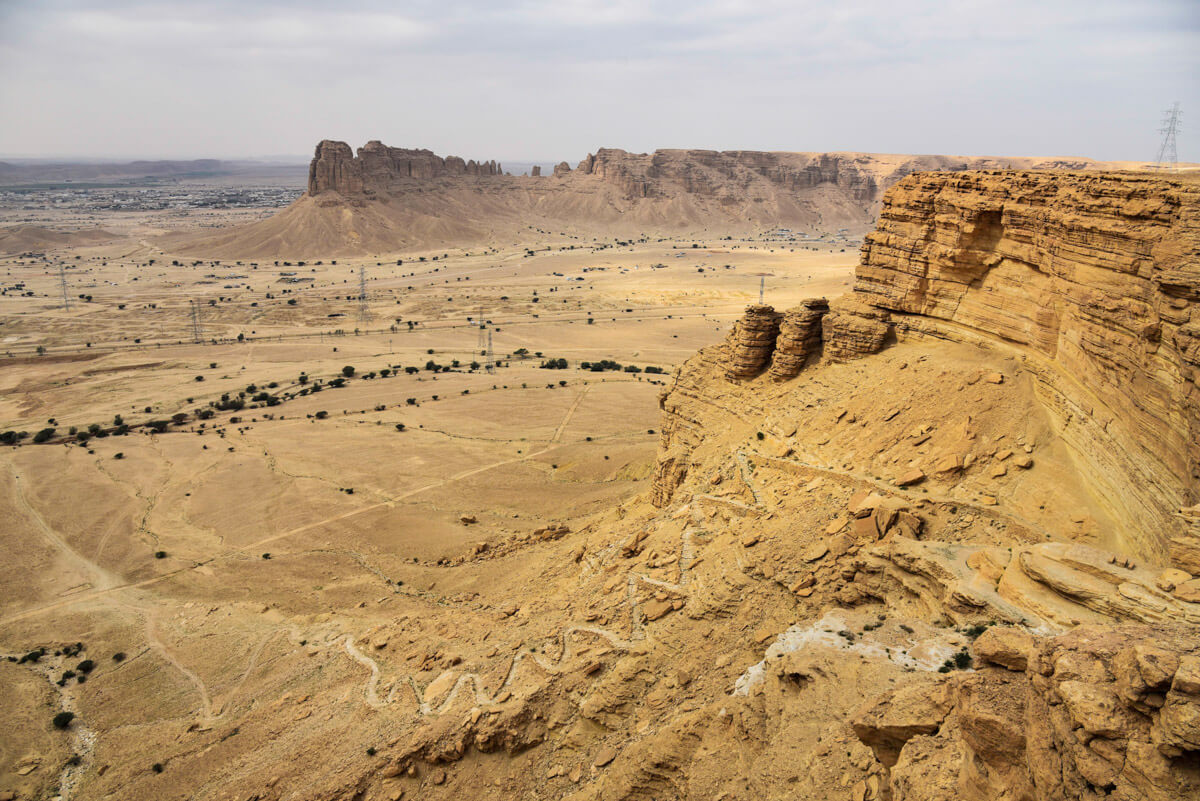
Best time to visit Saudi Arabia
The best time to visit Saudi Arabia is during the cooler months, from November to February.
March, April and October could be bearable but outside this ”winter season”, the country could be too hot to enjoy.
By the way, note that the north of Saudi Arabia can be extremely cold in winter, with temperatures below 0ºC in transited regions such as Al-Ula and Tabouk.
5 Top things to experience in Saudi Arabia
Visiting Mada’in Saleh, like Petra but more epic
Mada’in Saleh is an archaeological complex composed of hundreds of tombs carved out from rocks and scattered across the desert. Mada’in Saleh was founded by the Nabateans, the same civilization that built Petra.
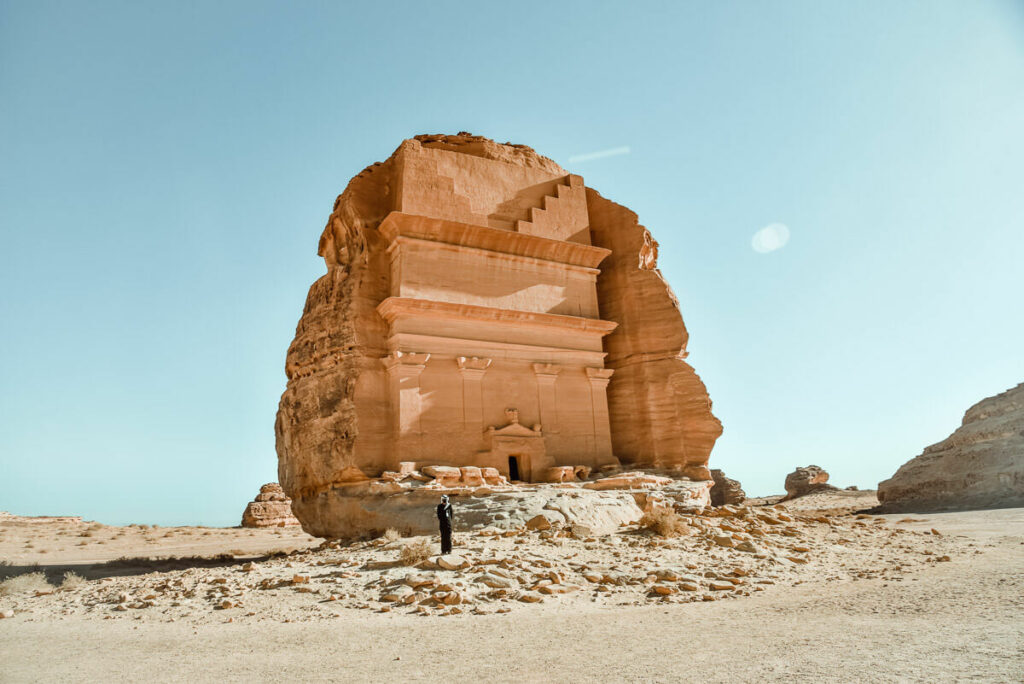
Being one of the first tourists to ever visit Medina, the second holiest city in Islam
The city of Medina had remained off-limits to non-Muslims for decades but from 2022, Western tourists are allowed to visit the city, as long as you stay just at the entrance of the Holy Mosque, the place where Prophet Mohammed is buried.
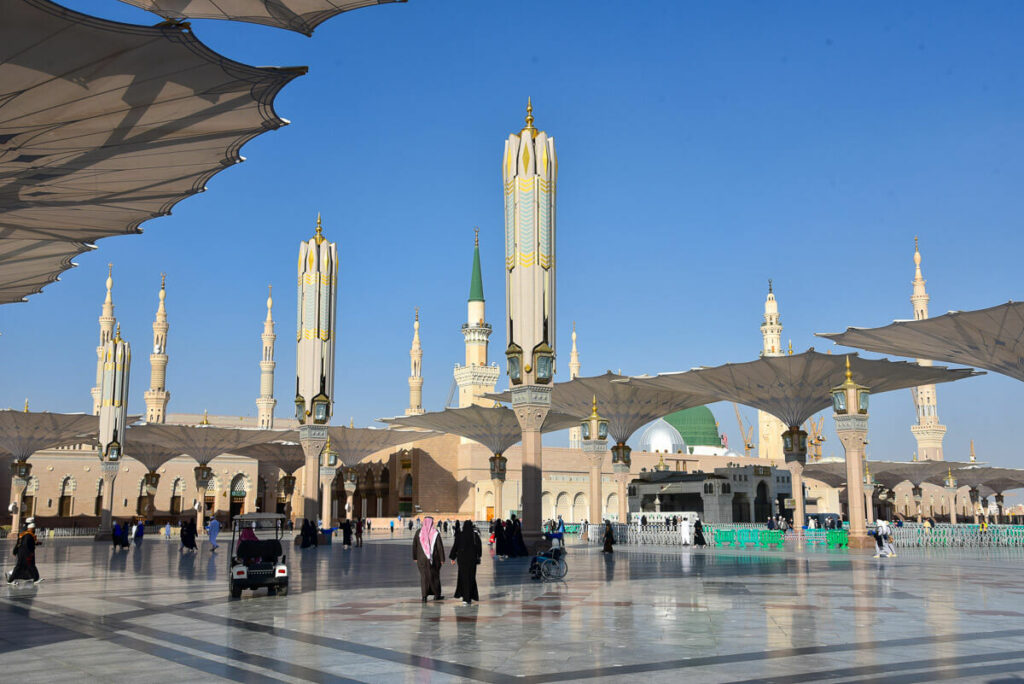
Exploring Fayfa, a region of Saudi Arabia with Yemeni-like culture
Fayfa is a southern region bordering Yemen that historically, had been part of Yemen, so several aspects of their culture – including the way they dress and their cuisine – have remained.
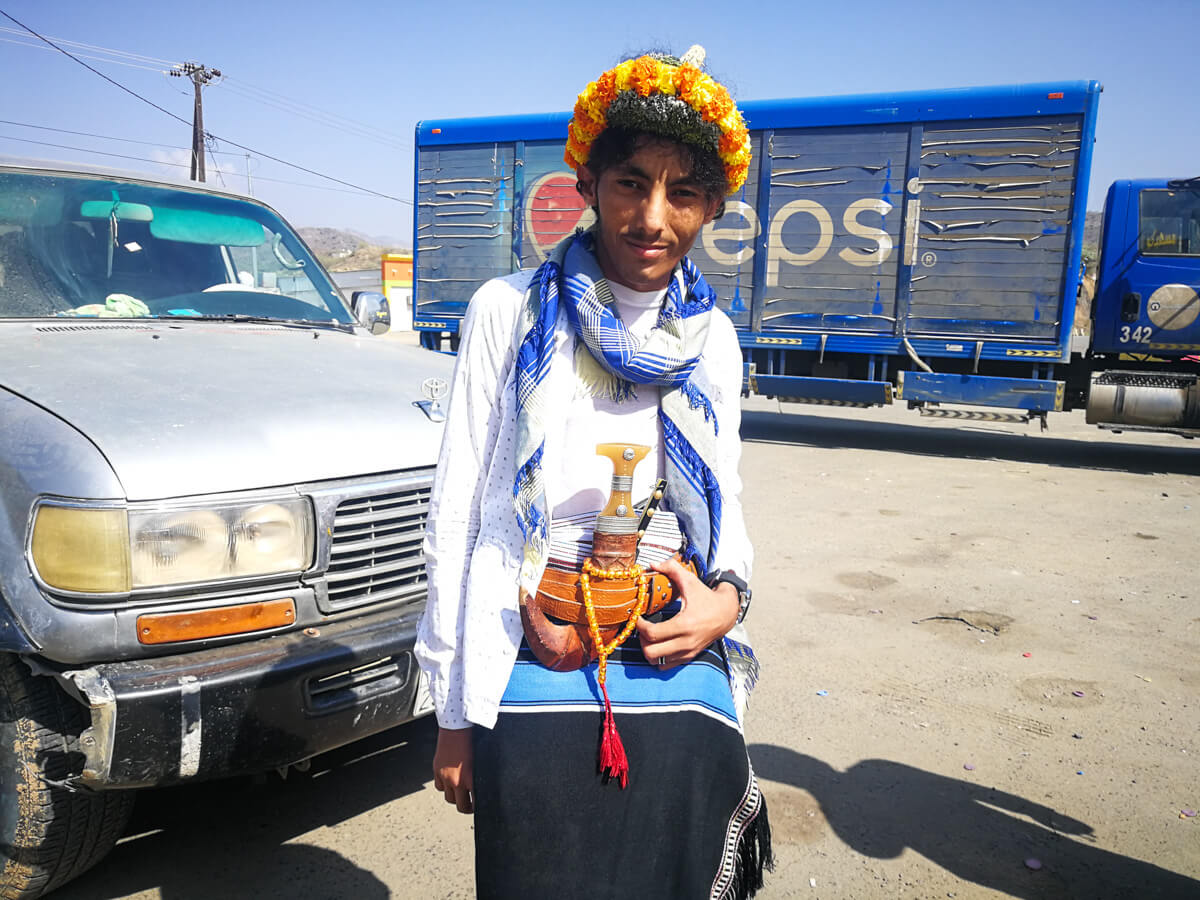
Discover the natural wonders from Tabouk region
Tabouk is a northern region bordering Jordan home to incredible wadis, rock formations, deserts and Bedouins.
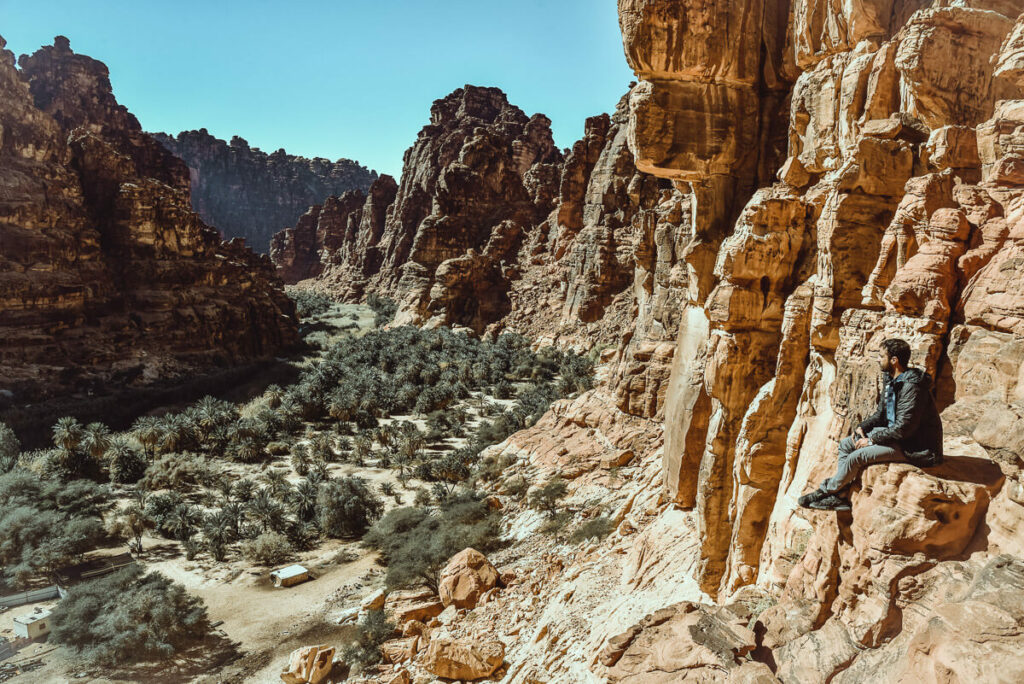
Snorkelling in the Read Sea
Everybody knows about the beauty of the Red Sea, the reason why Egypt has become a prime diving destination. However, few people know that the same coral reefs can also be found along the Saudi Arabia coast, and I particularly like the area between Yanbu and Umluj.
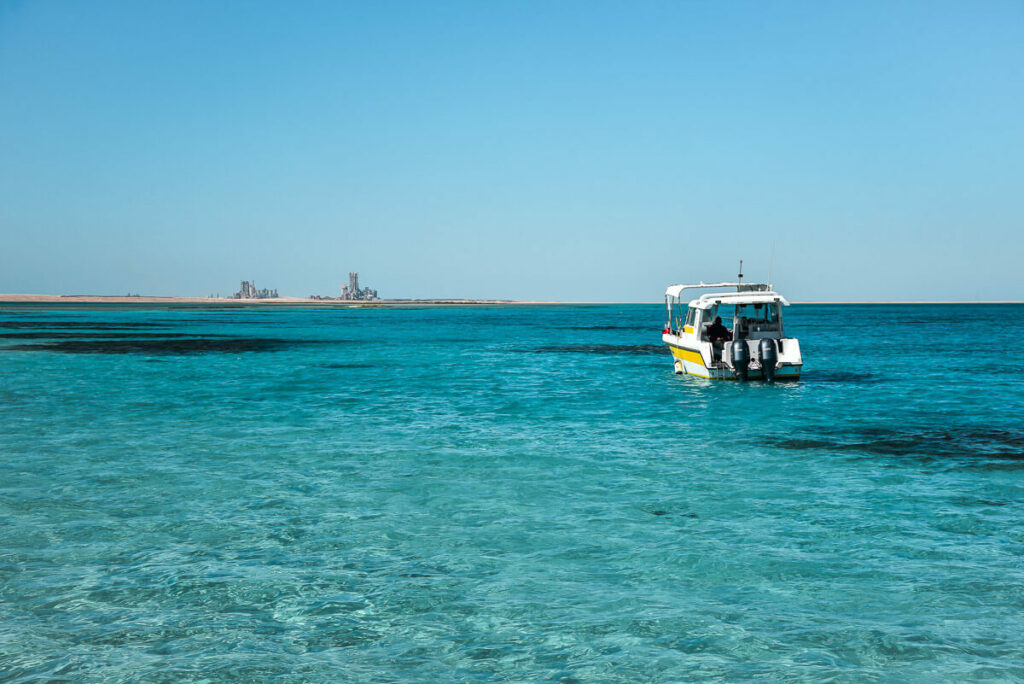
How to get to Saudi Arabia
Remember to get travel insurance for Saudi Arabia
Saudi Arabia’s health care is extremely expensive, so insurance is a must.
IATI Insurance offers different plans, for all budgets.
Get your 5% exclusive discount if purchasing via this link
How to travel to Saudi Arabia by air
The easiest way to travel to Saudi Arabia is by flying in. There are loads of international flights, especially to Jeddah and Riyadh.
Saudia Airlines has many direct flights from Europe and other destinations, while other airlines like Pegasus or Emirates fly there via Istanbul and Dubai, respectively,
How to travel to Saudi Arabia by land
As long as you have a valid visa for traveling to Saudi, getting in to the country by land is totally doable.
Saudi Arabia shares a border with:
- United Arab Emirates – Easy to cross.
- Oman – The desert road that goes through the Empty Quarter, linking Oman and Saudi was recently open. This border crossing can be quite an adventure. Read my Oman travel guide.
- Qatar – Should be easy to cross, now that the displomatic relations between both countries have normalized.
- Bahrain – Easy to cross.
- Iraq – Since March 2021, it’s now possible to travel to Iraq, so overlanding into Saudi shouldn’t be a big issue.
- Jordan – Easy to cross.
- Yemen – Not possible to cross. Read my Yemen travel guide
Read: A guide to finding the best area to stay in Dubai
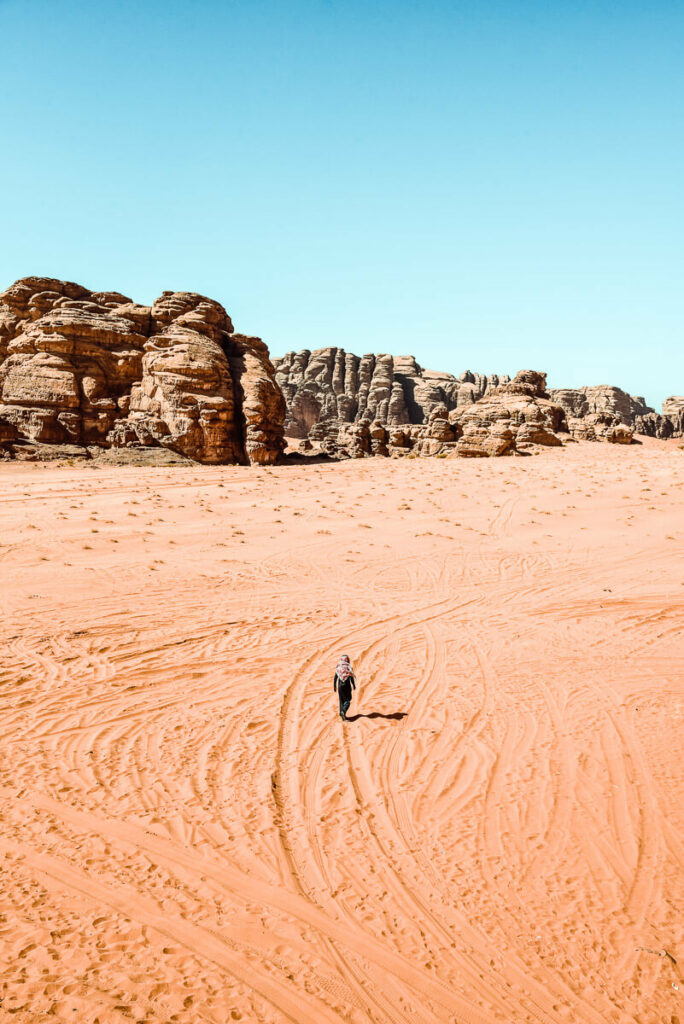
Tourism in Saudi Arabia, what is it like
Interested in off-the-beaten-track countries? Check:
Somaliland travel guide
Eritrea travel guide
As you may imagine, tourism in Saudi Arabia is in a very embryonic stage.
Random Saudi: Where are you from?
Me: Spain
Random Saudi: Where do you live, in Jeddah or Riyadh?
Me: Nowhere, I am just visiting 🙂
Random Saudi: No, I mean where in Saudi are you working?
I had this conversation over and over. They still don’t know that foreigners can now travel to Saudi Arabia.
When I was exploring the southern part of the country and was walking around the souk with my big backpack, people were asking me if I was carrying a parachute and one even said if it was an inflatable boat.
This was back in 2019, when I visited the southern part of the country. When I came back in 2022, the country had massively changed, so I didn’t really experience any of the above conversations, but that’s partly because I explored the northern part, which is far more developed and receives more international visitors.
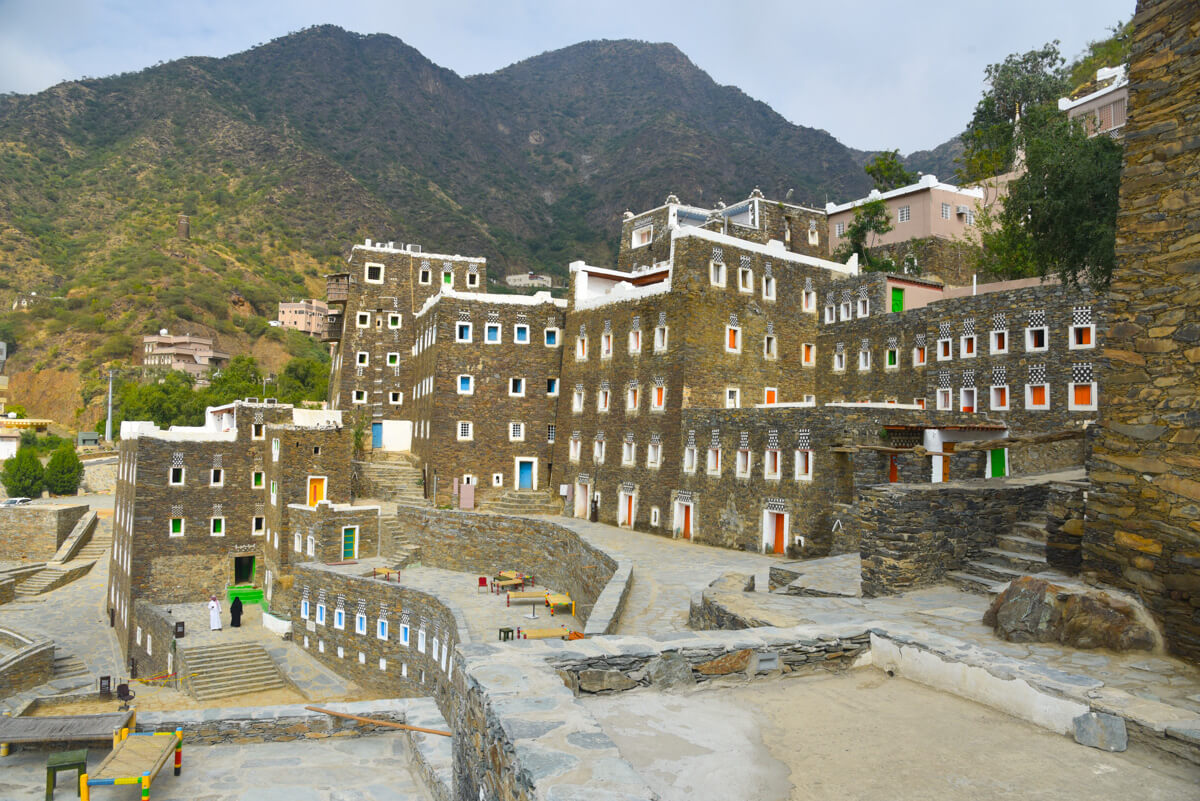
So yeah, the idea of having international visitors who are not expats or workers is still a concept they aren’t familiar with.
However, there is a relatively developed domestic tourism infrastructure, so you can find hotels pretty much everywhere, even though they tend to be expensive.
Moreover, as per things to do, you should know that there are loads, loads of things to do in this country.
I mean, just check its size and you will see that it is bigger than any European country. Here you can check my complete Saudi itinerary.
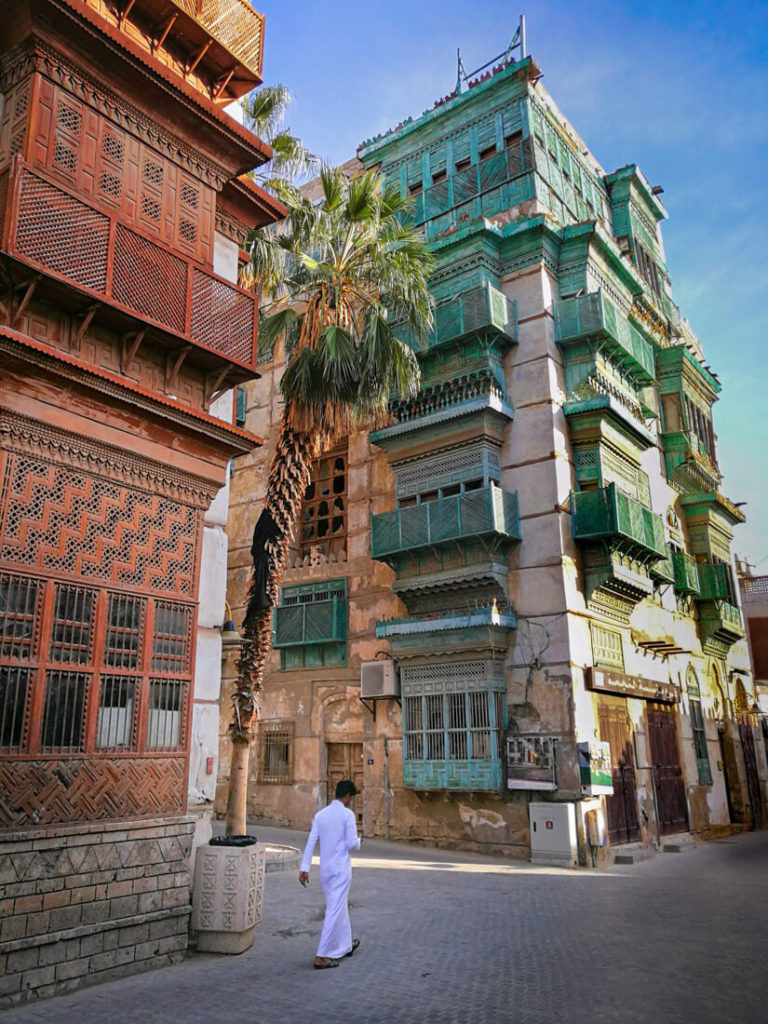
Is it ethical to travel to Saudi Arabia?
When I came back from Saudi Arabia, I received many, many messages from very upset people who claimed that traveling to Saudi Arabia implicated collaborating with a regime that doesn’t respect basic human rights.
Some messages were from friendly, skeptical people who wanted a response, while others were from really extreme haters who I blocked right away.
Well, let me tell you something: like in any place around the world, you find good and bad people and, when I travel, I don’t meet with Prime Ministers but I visit places and hang out with humble locals.
This is a very long and controversial topic, so I recommend you read my article:
Is it ethical to travel to Saudi Arabia as a tourist?

How to access blocked sites in Saudi
Something you should know is that, in Saudi, the internet is censored.
This means that some websites might be blocked and inaccessible for regular internet users.
Moreover, because of this censorship and, since there is no freedom of speech, the Government reserves the right to monitor your internet activity.
Therefore, if you want to access blocked sites and navigate anonymously, you will need something called a VPN (Virtual Private Network).
There are several VPNs in the market but the one I personally use and recommend is ExpressVPN, the fastest and the one that works best for Saudi.
If you have no clue about VPNs, read my tutorial: What is it and how to find the right VPN for Saudi Arabia
Tips on how to behave when you travel in Saudi
In Saudi Arabia, the internet is censored, which means that some websites and internet services are blocked. If you want to access them you will need a VPN and for that, I recommend ExpressVPN, the fastest and works best for Saudi.
CLICK HERE TO LEARN MORE ABOUT ExpressVPN
Heads-up.
Saudi Arabia is the most religious country I have ever been to.
In fact, this is the most religious Muslim country in the world. Everybody knows that.
Most Saudis follow a branch of Islam named Wahhabism, which is characterized for having the most conservative interpretation of Islam and the law of Saudi Arabia strictly follows it.
This means that their penal code includes some very hardcore punishments such as public beheading or getting flogged. This is their country and we are not here to judge and unless you plan to kill someone, smuggle drugs or have sex in public, you shouldn’t be afraid of traveling to Saudi Arabia as a tourist.
Seriously, it is not even close to what you may think.
Saudis prefer to be called Salafis, instead of Wahabis. In their eyes, Wahabism is a few steps ahead than Salafism when it comes to conservatism, meaning that it is really extreme, a term usually used to designate Islamic terrorists. Whereas Salafists are really, really conservative in nature, it is more socially accepted. Thank you, Graham, from Inside Other Places for the clarification
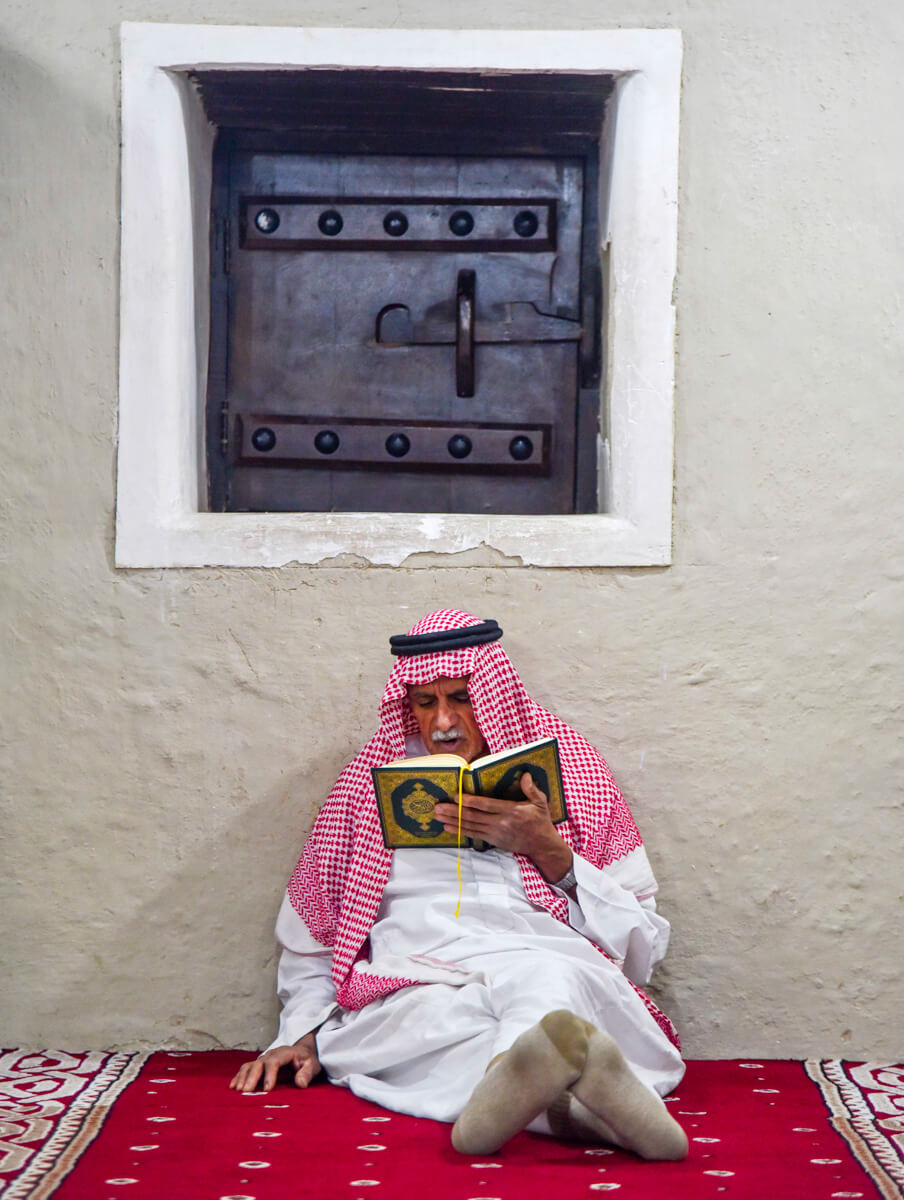
Some rules you need to follow when you travel to Saudi Arabia
Women need to wear an abaya – The abaya is a local dress that covers your body (not your head).
Some public spaces are segregated by sex – You will figure it out by yourself but some restaurants or cafés are still composed of two areas: men and family section. Women or men that go with women need to sit in the family section. This kind of segregation is slowly disappearing, especially in Jeddah and Riyadh.
Depending on where you are, during prayer time, you can’t be inside shops or restaurants – To be honest, this rule has become more flexible but, outside of Riyadh and Jeddah, they kicked me out from shops during the prayers and I could not even stand in front but I had to walk away. A very weird rule.
Don’t drink alcohol – Drinking alcohol in Saudi Arabia is not legal, not even in 5-star hotels.
Seriously, stay away from drugs – Drugs may lead to death sentence, so don’t play with them.
No public shows of affection – Same as when you travel to Dubai or Qatar.
Don’t say you are an atheist – Even if you were, say you are a Christian or any major religion in your home country. Being an atheist can be considered as blasphemy and this is a very serious crime in Saudi. Moreover, you came to Saudi to meet people and make local friends, so saying you are an atheist won’t help you at all.
On Friday, everything is closed until Asr prayer, which is around 4 or 5pm – Not everything will be closed but some restaurants may open in the morning. However, at noon, during Dhuhr prayer, absolutely everything is closed.
Eat with your right hand, always – This is a generic Muslim rule but in Saudi is particularly strict. If you are sharing a meal with more traditional people, try to always eat with your right hand. I am actually left-handed and sometimes I forget about it and Saudi has been the only place where the locals got a bit upset when they saw me eating with my left hand.
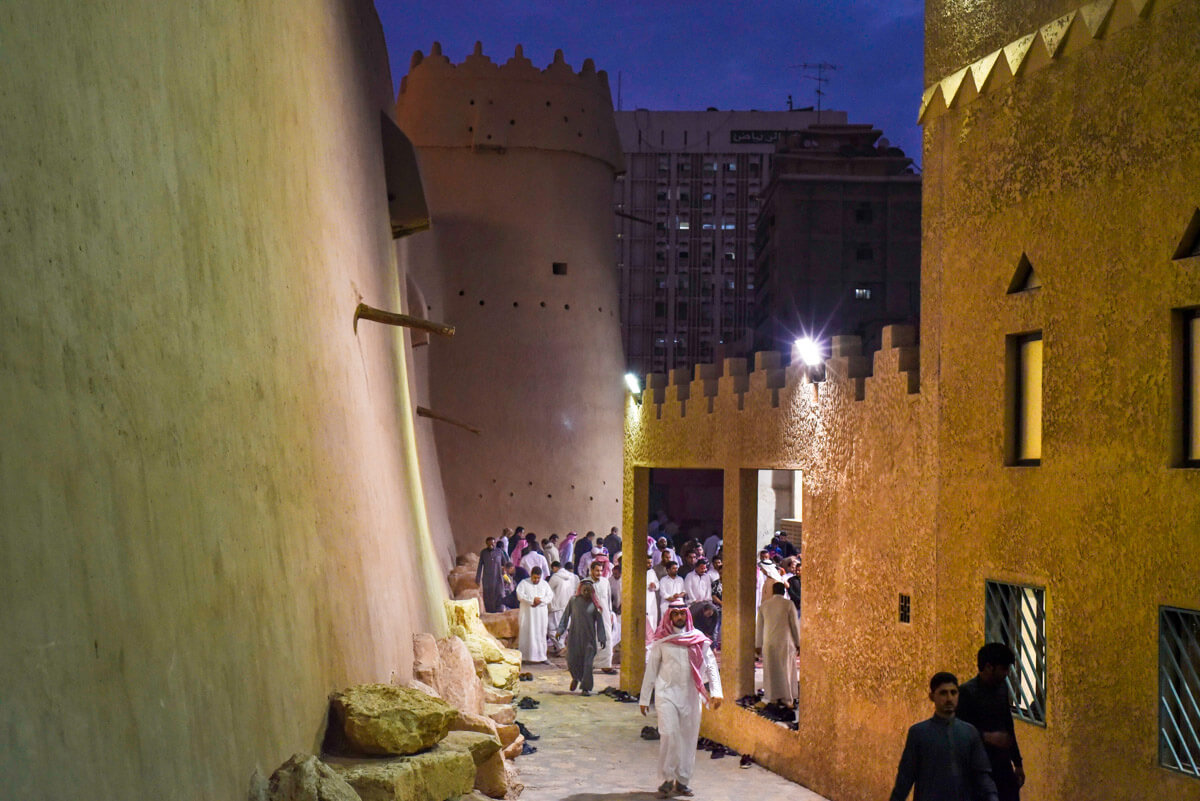
Misconceptions about Saudi Arabia – Things you can actually do
Like I said before, in the last couple of years, the laws of Saudi Arabia have become more flexible. Well, this is not entirely right. According to my local Saudi friends, some laws haven’t been changed but the religious Islamic police (mutaween) has lost power, so they aren’t controlling what people do anymore.
Men and women who aren’t family related can hang out together, in public – Some years ago, you couldn’t go to a restaurant or a café with a friend from the opposite sex but now you can do it normally, like in any other country.
Foreign women can travel around the country independently, and alone – I have already lost count of all the women who asked me if they can go there by themselves. Yes, you can travel to Saudi Arabia as a woman, by yourself. Would it be challenging? It would be different from being a man, indeed, but it is definitely legal.
Single foreign women can also visit Saudi on a tourist visa – You can travel to Saudi with your unmarried boyfriend and even if you are single, no problem.
Women don’t need to wear hijab – You don’t need to cover your head but, like I just said, you must cover your body with an abaya. If you travel to Iran, you will see that the clothing rules are even more strict.
Women can drive, including renting a car – From June 2018, women can finally drive and, as a female tourist, you can also rent it.
Men can wear shorts – Nobody will say anything to you.
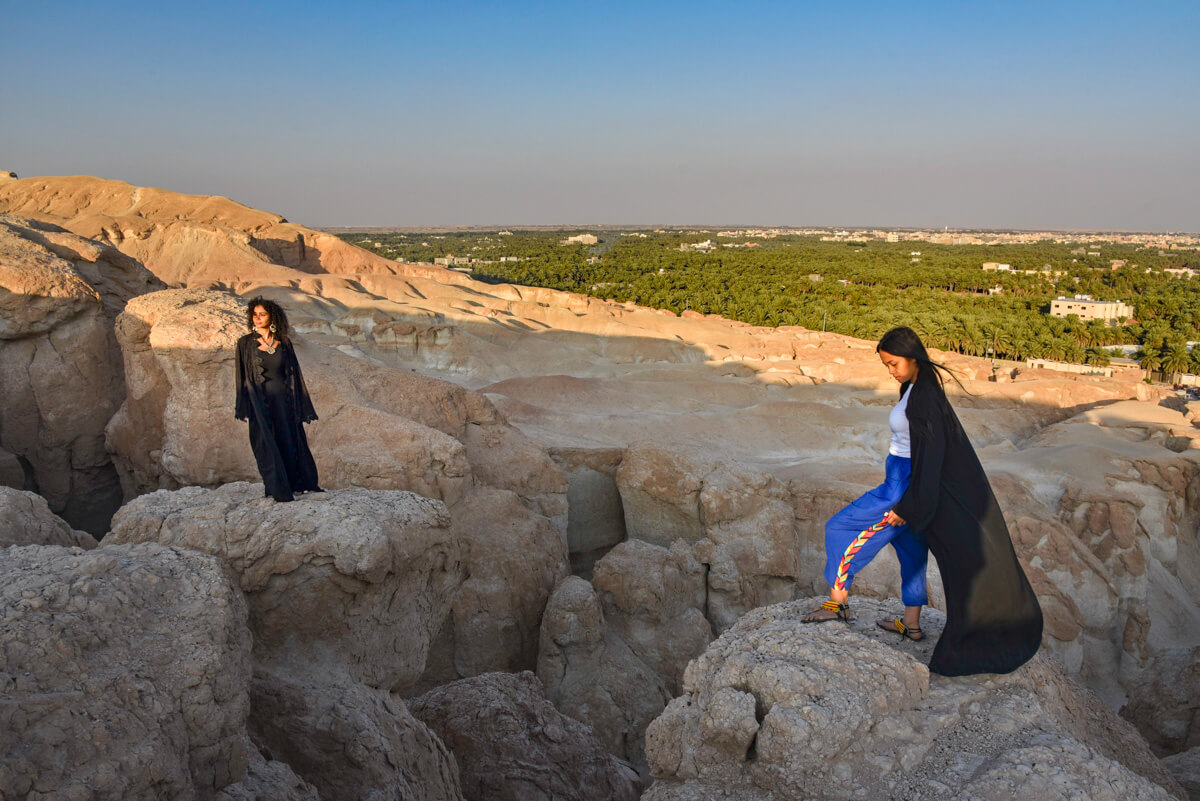
The people and the culture – The Saudis
Like in many countries in the Middle East, in Saudi, you find loads of particularly kind people.
Typically, Saudis are so easy to recognize because they wear the thawb, which is the white traditional dress. They also cover their heads with the ghutrah, which can be of different colors but red & white seems to be the most commonly used.

Language in Saudi Arabia
Arabic is the official language. English can be a sometimes problem when you travel in Saudi Arabia, as most people don’t speak it but you will always find someone who does.
Religion in Saudi Arabia
According to the Saudi Government, 100% of the Saudis are Muslim, the large majority being Sunni Wahabbis. There is a large Shia population, as well. Remember that Saudis are very conservative, so try to be respectful and sensitive.
Hospitality in Saudi
Before traveling to Saudi Arabia, I knew a lot of people who had been there on a business visa and the truth is that I am extremely disappointed with all of them because they had told me:
- Saudis are arrogant
- Saudis are racist to anyone who is not from the Gulf
- There is nothing to do in Saudi
Seriously, I don’t know where they have been but, from the moment I met the immigration officer who stamped my passport with a big smile while he tried to improve his Spanish, I have just had positive experiences with Saudi people.
Saudi people are extremely hospitable. From endless coffee and meal invitations to random people who insisted on showing me around the city, I seriously met some incredible locals, some of whom I can call now friends.
Honestly, the experience was no different from the blessings of hospitality in Pakistan, Oman or Iran, no kidding. I shared many short moments with so many locals but there were two Saudis in particular who really changed the perspective of my trip.
First, I met Abdullah, an English teacher from Kharj. He picked me up when I was hitchhiking and drove me to a city that was 80km away (and it was not his way). There, we met with one of his friends, we had lunch at his house and then we visited his camel farm.
Abdullah taught me many interesting things about Saudi culture, especially their interpretation of Islam.
Do you like extreme destinations? Read: How to travel to Syria

A few days after, I met Ibrahim, a real Saudi from Abha. We met at the souk of Abha and, after having a chat, he invited me to his famous village named Rajal Alma.
We had dinner, stayed at his friend’s house and showed me around on the day after. Ibrahim comes from a very traditional Saudi family (his father was actually a famous Imam from the region) but he married a Filipina girl, something quite unheard of from Saudis with a similar background.
Seriously, don’t trust anyone who has just been to Jeddah or Riyadh for business. First of all, you can’t judge a country by the inhabitants of a several-million people city.
And second of all, don’t trust the judgment from someone who has traveled to Saudi Arabia for business because he hasn’t seen much beyond the office, the fancy restaurant, and the hotel.
Saudis are not happy about how the Western media portraits them
Our media doesn’t really do justice to Saudi people, as they portray them as religious fanatics who force women to submit to their Sharia rules.
The reality is miles away from this stereotype.
Like in any country, there are loads of awesome people and, like in any off the beaten track Muslim country, most of them are extra-nice with foreigners.
Local Saudi women
Most women in Saudi wear the black niqab, which covers the whole face except the eyes.
The reason they wear it is that, according to their interpretation of the Quran, women can’t show their face to any man who isn’t their dad, uncles, grandfathers, sons, and husband, of course.
For years, many pro-feminist groups in Europe have been claiming that the use of niqab is sexist, against the women’s rights and they wear it against their will.
Whereas I fully understand their point, I think that their argument is quite simplistic and it just lets you see one tiny side of the whole picture.
Please note that I am not trying to justify the use of the niqab but I just wanted you to know that many Saudi women actually choose to wear it. Really.
They choose to wear it because they think that this is the right thing to do because the Quran says so. They believe they need to wear it as much as men believe it.
Obviously, there will be many cases of liberal Saudi women who will tell you a different story but I am just talking in generic terms.
My point is that this topic is way more complicated than we think and, as tourists, we shouldn’t be talking or trying to change it because you are traveling to Saudi Arabia to learn about their culture and visit beautiful places.
How to deal with women in Saudi
Now that every day you see more and more women working in public spaces, you are likely to talk to quite a few Saudi women who wear the niqab.
If you are a man, don’t try to shake hands and keep a reasonable distance with them but you can talk to them freely and you will see that they are as lovely women like any other.
If you are a foreign woman, they will definitely be extra nice to you and, if you are on the countryside, expect them to invite you to their house.
When I visited Al-Jawf, 1,000km north of Riyadh, I went there to work on an assignment for a local company and I was very lucky to be received by two super nice ladies wearing niqab. I spent the whole day with them.
They showed me around their province, we went to have some coffee and I even went to their house where they fed me until I exploded. They were as hospitable as any Muslim man I had met before and the only difference is that I didn’t see their faces. It was an enriching experience.
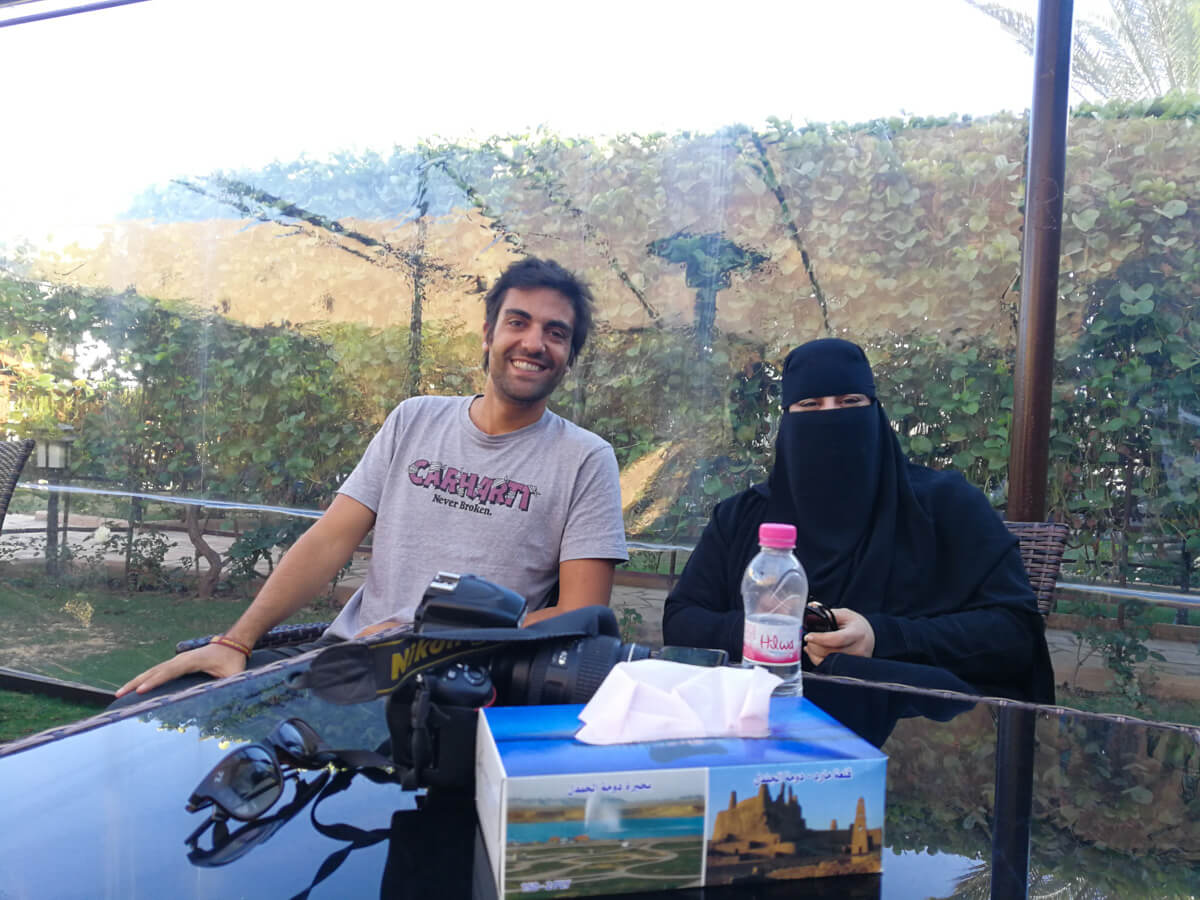
Saudis are multi-ethnic
For centuries, Muslims from all over the world came to Saudi on their journey to Mecca and, at some point, decided to settle there.
Over time, they became Saudi citizens and that is why, today, you find Saudis from all types of ethnicities.
From Bedouin to East-African-looking people and even the cultural-Yemeni-like people from the south of the country, in Jizan, Saudi is the most multi-ethnic Arab country.
For me, this was one of the most surprising things about the country.
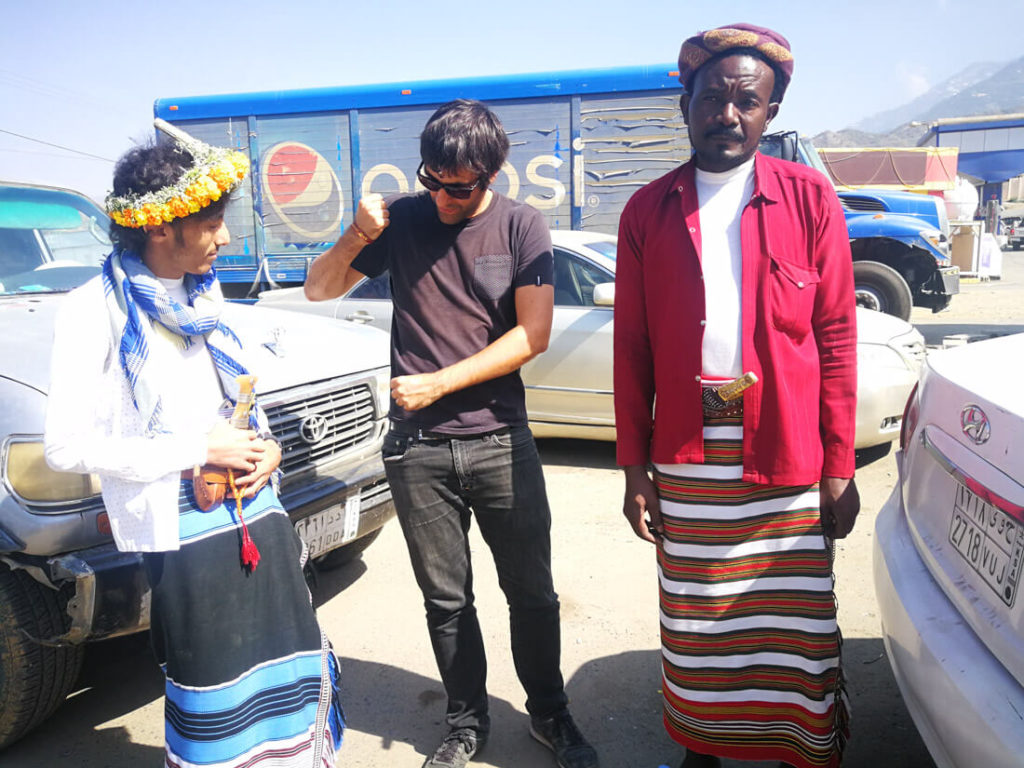
Food when visiting Saudi Arabia
The food was another extremely surprising thing about traveling in Saudi.
Before visiting Saudi, I was traveling in Oman for 1 month. In Oman, I felt that, after day 2, I had already tasted all the local food, which was always simplified to different variations of rice with meat, chicken or fish.
Then, I tasted one or two different local dishes in some houses and the rest was all Indian food.
Saudi, however, is a different story. Since it borders with so many Arabic countries, its huge dimensions with many different geographical areas and its multi-ethnic population, the food in Saudi Arabia is a real blend of all the Arabic food you can think of.
From the Yemeni food-like dishes from the south to the olive oil-rich food from the north of the country, Levantine Arabic dishes such as vine leaves and makluba, foul and hummus for breakfast and, of course, the classic Gulf food that includes all sorts of rice with meat, the cuisine of Saudi Arabia also shows the cultural richness of the country.
By the way, traditionally, Saudis eat on the floor and use their right hand to eat. Eating like them is a sign of respect but if you are struggling, you can always help yourself with a spoon.

Solo female travel in Saudi
Remember to get travel insurance for Saudi Arabia
Saudi Arabia’s health care is extremely expensive, so insurance is a must.
IATI Insurance offers different plans, for all budgets.
Get your 5% exclusive discount if purchasing via this link
Since I left Saudi Arabia, I have been bombed with tons of questions from many women who are skeptical about traveling to Saudi.
Sure, Saudi is an extremely patriarchal country, so this kind of reaction is perfectly understandable. However, let me tell you that, as a woman, Saudi Arabia is much safer than you could ever think.
I am perfectly aware that, since I am not a woman, my opinion doesn’t really count here but, luckily, during my journey, I met Nada al Nahdi, a Yemeni / Indonesian girl who was born in Saudi, so she knows the people and culture very well and has traveled around the country extensively.
Nada wrote an article about this topic on my site, so if you want to know more, read:
9 misconceptions about traveling to Saudi Arabia as a woman.
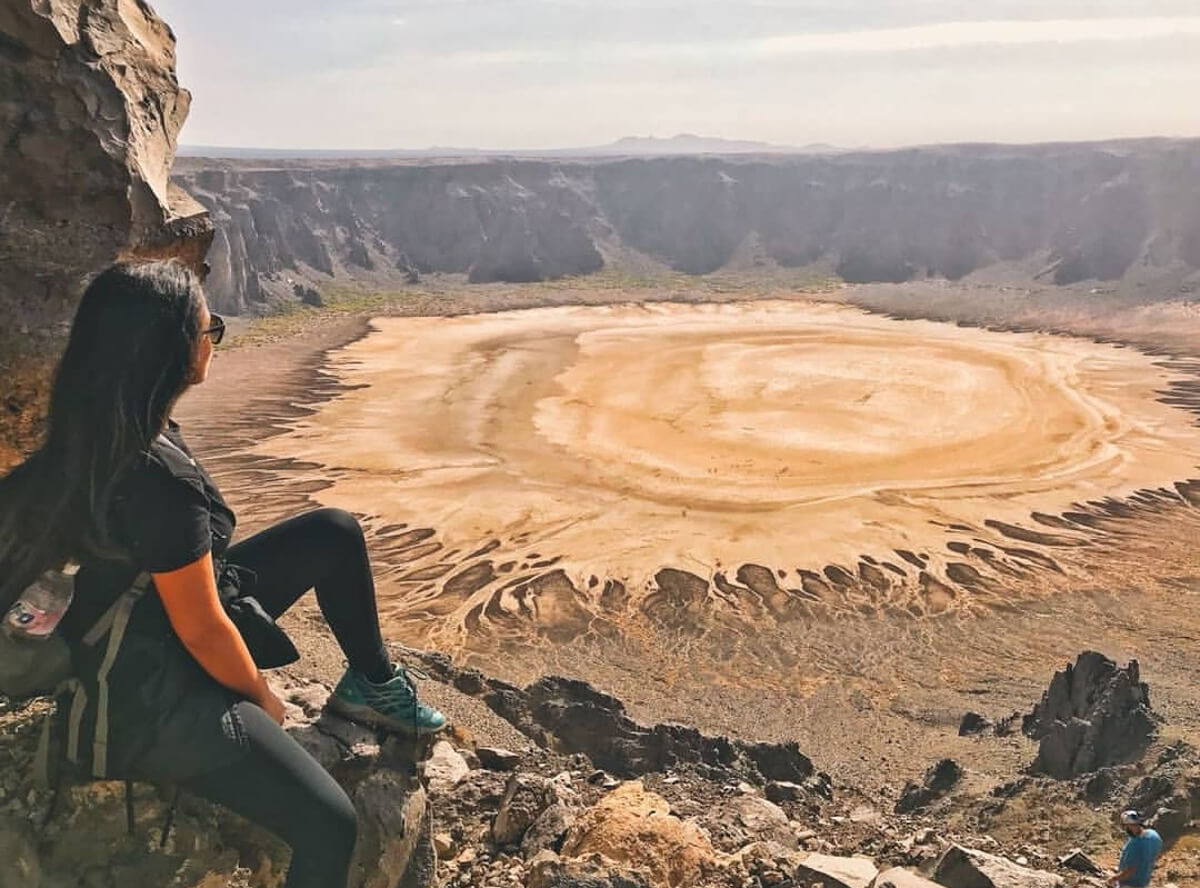
Is it safe to travel to Saudi Arabia?
From a crime perspective, Saudi Arabia is just another very safe place to visit in the Middle East. I mean, you should always be aware of your belongings but pickpocketing or being robbed is quite unheard of.
As per terrorism threat, I will not deny the fact that there have been some one-off terrorist attacks but even UK travel advice says that, except for the areas close to the Yemeni border, all Saudi Arabia is safe to visit.
However, I also went to Jizan, the region bordering Yemen and everything was extra peaceful. The war is happening on the other side of the border, not in Saudi.
In my opinion, the only actual threat when traveling in Saudi Arabia are the extremely crazy drivers. Seriously, after all my years of travels, I can now confirm that Saudi people are the most insane people on wheels.
For a more detailed analysis, read this article from Joao Leitao: Is Saudi Arabia a safe country to travel?
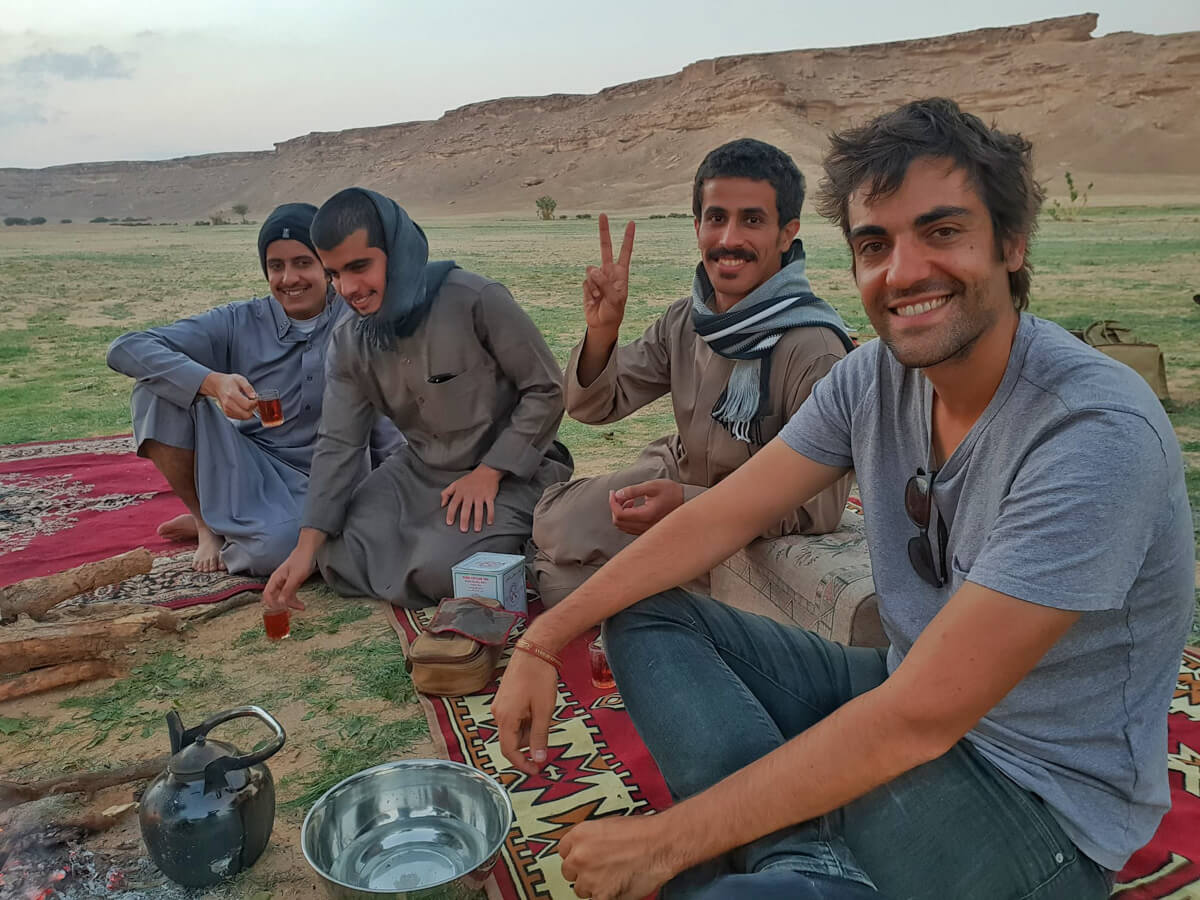
Money, budget and costs in Saudi Arabia
The Saudi Rial is the official currency and:
1 USD = 3.75 SAR
Exchanging money
Euros, United States dollars or British Pounds are widely accepted. You can even exchange Indian and Pakistani rupees and other Asian currencies, as there is a large Asian population living in Saudi.
Of course, the currencies from other Gulf countries, such as Omani Rials or UAE Dirhams are also accepted.
ATM and credit cards
ATMs are available pretty much everywhere and credit cards are accepted in most modern cafés, restaurants, and hotels. However, bring always some extra cash, as the Indian-run cafés and other more local places don’t accept cards.
How much does it cost to travel in Saudi Arabia?
These are the prices of the most typical things:
- Budget Hotel – Double room from 100 to 150SAR
- Breakfast in Indian-run café – 5 to 10SAR
- Breakfast in local Saudi eatery – 10 to 15SAR
- Lunch in Indian-run restaurant – 10 to 15SAR
- Lunch in local Saudi eatery – 15 to 20SAR
- Lunch in mid-range restaurant – From 30-35SAR
- Short taxi ride in Riyadh – 15 to 25SAR
Transportation: How to move around when visiting in Saudi Arabia
Something you need to know: Saudi Arabia is the least walking-friendly place I have ever been to. That being said, here is what you need to know regarding moving around the Kingdom:
Moving inside cities
Public transportation in Saudi cities is awful and, except in some parts of Jeddah, you must drive with your own car or by taxi. You can’t seriously walk.
If you aren’t self-driving, I recommend you download Uber or Careem, so you won’t have to deal with negotiating a price with a taxi.
Domestic flights
Another problem of Saudi Arabia is that distances are ridiculously huge and the nice places to visit in Saudi are scattered all around the country.
For example, Al-Ula is nearly 1,000km north of Jeddah and Jizan is another 1,000 south of Jeddah. If you are short of time, a very good alternative is taking domestic flights.
I recommend you check on Saudia Airlines, as they have the largest number of domestic connections in the country.
For cheaper flights, check Flyadeal.
Actually, the most effective way to travel in Saudi Arabia would be taking a domestic flight and then renting a car in the destination itself.
Renting a car in Saudi Arabia
Road tripping around Saudi Arabia is the best way to enjoy the country, and I strongly recommend you do that.
Gas is cheap, so are the daily rental rates. However, all companies offer limited daily mileage, around 250-300km a day I think, so if you drive to faraway places like Al-Ula or Jizan, it can get expensive for solo travelers.
By the way, most rental companies won’t rent you a car if you don’t have an international driving license, so remember to convert it before leaving your country.
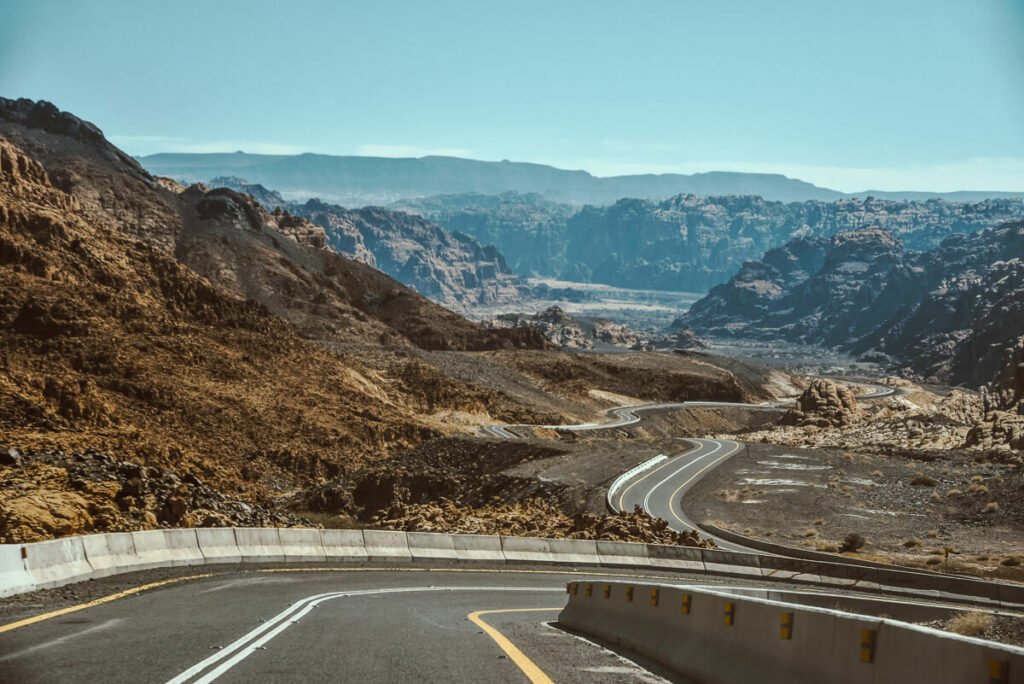
Moving around Saudi Arabia by bus
You can also move by bus between cities. They are very cheap but the problem is that you will have to rely on taxis once you get to any destination. There is not a single city in Saudi which is walking friendly.
You check all bus schedules and buy tickets on this website.
Hitchhiking
As crazy as it may sound, I hitchhiked all across Saudi Arabia.
I actually hitchhiked from Riyadh to Jizan, 1,300km. I had some really good experiences but, at the same time, I had not so good experiences.
On the one hand, it is relatively easy to get a ride and, normally, Saudis will be extremely helpful and, if you are lucky, they will invite you to their house.
On the other hand, most places in Saudi are connected with highways where people drive extremely fast and, sometimes, they overtake cars by the shoulder of the road, which is extremely dangerous if you are waiting there.
Moreover, many Saudis are crazy drivers, more than in any other country I have been to. On one occasion, I refused to continue with a man because I was seriously afraid of dying. When I finally reached Jizan, I decided not to hitchhike anymore. It was too intense.
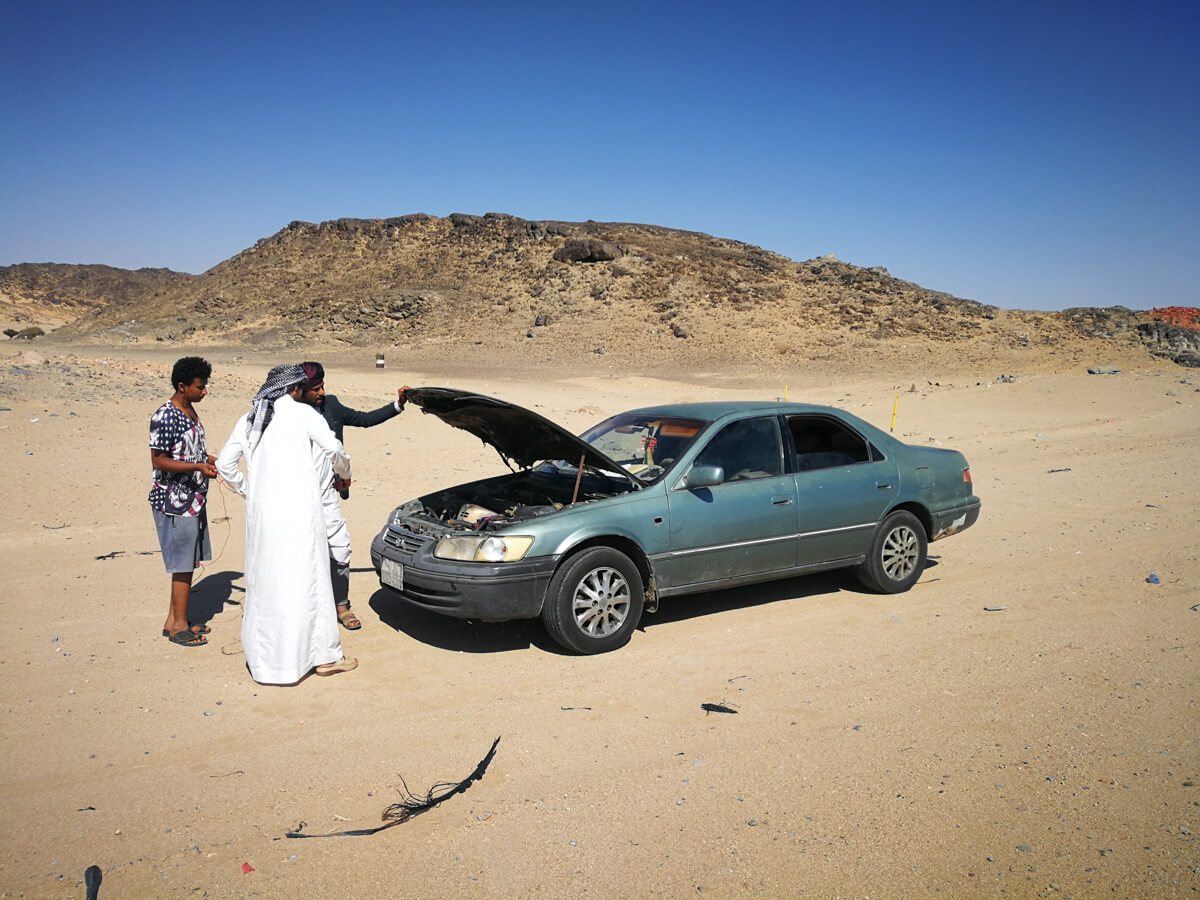
Internet and SIM Card
Connecting to Wi-Fi in Saudi
Saudi is a modern country, with pretty good Wi-Fi in most places.
Getting a SIM Card in Saudi
I got ZAIN which, according to locals, has the worst network but it was the only company I found which you could buy just 1 or 2GB. Mobily is the most popular one but they asked me to buy 10GB, at least, which was around 150SR (40USD). With ZAIN, I think I just paid around 30SR for the SIM Card plus 1GB worth of data.
Remember that, in Saudi, the internet is censored and, if you want to access blocked sites, you will need a VPN.
Read: How to find the right VPN for Saudi Arabia
Accommodation: where to stay in Saudi
In Saudi Arabia, there is plenty of accommodation options.
Typically, budget hotels will be apartment-style hotels, which tend to be a very good value-for-money option when you are two people or more.
In Jeddah and Riyadh, good but basic apartment-style hotel will start at 50-60USD a night, approximately, while in smaller towns, you can find for 30USD.
Read: How to find the right accommodation in Riyadh
Like in any Gulf country, luxury hotels abound in Saudi, especially in big cities.
More information for traveling to Saudi
Remember to get travel insurance for Saudi Arabia
Saudi Arabia’s health care is extremely expensive, so insurance is a must.
IATI Insurance offers different plans, for all budgets.
Get your 5% exclusive discount if purchasing via this link
All guides and articles for traveling in Saudi Arabia destination
- Travel Guide to Riyadh
- Where to Stay in Riyadh
- Solo Female Travel Guide to Riyadh
- Is it Ethical to Visit Saudi Arabia as a Tourist
- Hitchhiking and Backpacking in Saudi Arabia
- VPN for Saudi Arabia
- Saudi Arabia Itinerary
Travel guides to other countries in the Middle East
- Iran Travel Guide
- Iraq Travel Guide
- Travel Guide to Oman
- Travel Guide to Lebanon
- Syria Travel Guide
- Palestine Travel Guide
- Yemen Travel Guide
You will also be interested in: Where in the Middle East is safe? and The most beautiful places in the Middle East.
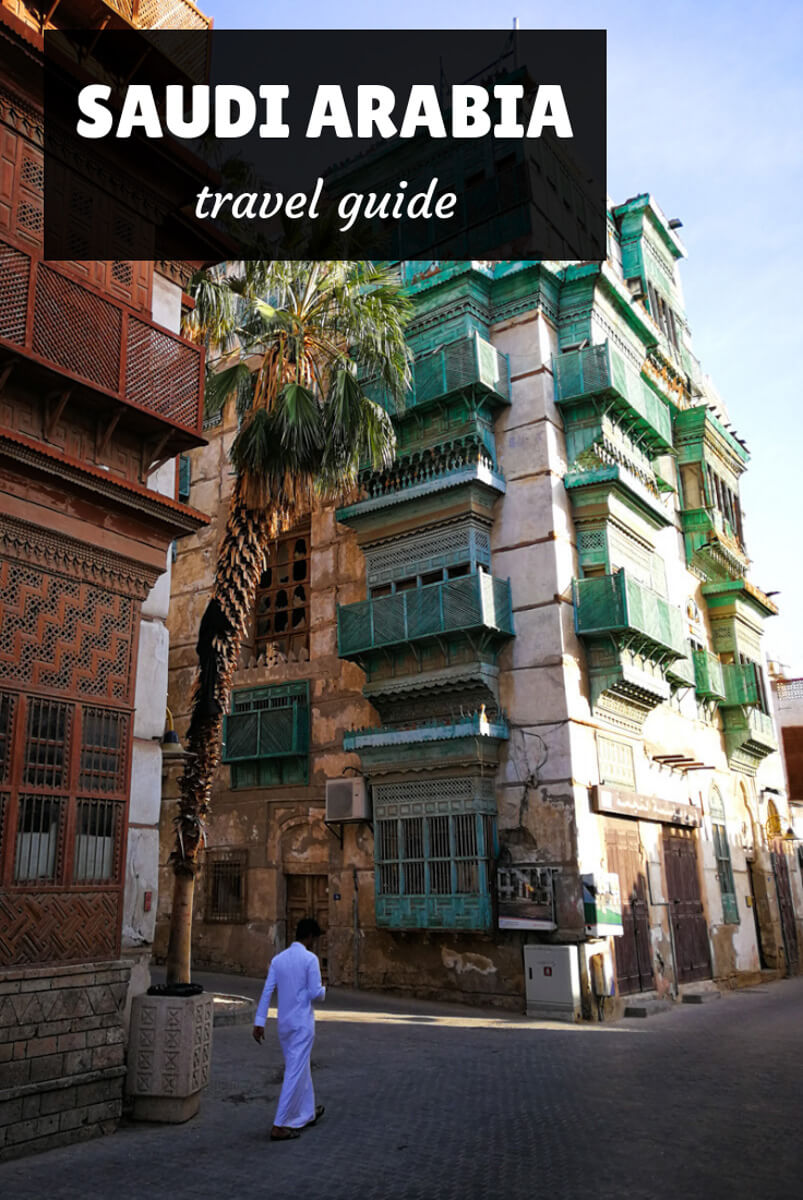
88 comments
Very nice article. I love the way you describe everything to know before going to saudi arabia. It was a pleasure to meet you again and hang out with you for a couple of days. After Iran we met in Saudi… Morocco next meeting. I’m also going to publish an article about Saudi Arabia soon. Big hug all the way from Ouarzazate.
Cheers man! and where is going to be the next after Morocco 😀 ?
Great introduction thanks, hope I can go in the not too distant future.
You should appreciate that no Muslim would refer to themselves as a Wahabi as it is an insulting term, albeit deserving for some more extreme believers. Saudis who follow the state approved version of Islam will probably call themselves Salafis, although this term can have a broader meaning elsewhere it is always conservative in nature.
Hey Graham, for some reason I had missed this comment. Thank you for the clarification. I have added a note in the respective section with a link to your blog
Saudi is up for big change. And it is going to be a positive change. It is slowly opening its door for the outside world for them to know more about saudi arabia and its rich cultural heritage and religion. The vision 2030 will have the world see a modern, welcoming, more hospitable and economically stronger Saudi Arabia. I have been living in this country for well over 10 years and I can attest with certainty that this is one of the most family friendly countries in the world. Everything in moderation and the laid back lifestyle will have you a lot of time to contemplate what really matters to you. You will always have a lot of “me time” since there aren’t too much of distraction around. The country is quiet, slow paced, and friendly. Recently, women are able to drive, cafes can have live performances in the form of bands or theatre. Men and women can now congregate in public. Cross my finger, in a few years time we will be seeing hundreds of thousands of tourists to experience Saudi Arabia…and we will be glad to welcome you all. By the way I am a filipino expat in this country.
thanks for your positive feedback!
I wanted to vist my friend in Saudi Arabia. Is it possible?
Hola,
Me ha encantado tu artículo, explicas muchísimos detalles interesantes y creo que es un sitio grandioso para visitar. Me encantaría si pudiese ser que nos pongamos en contacto ya que quisiera preguntarte alguna cosa más vía mail.
Hola Lara, si es una pregunta sobre viajar a Arabia Saudita, mejor si lo preguntas aquí mismo, en comentarios.
Pero este es el artículo en inglés, así que mejor publícalo en el link en español: https://againstthecompass.com/es/viajar-a-arabia-saudita/
Thank you so much for this … look forward to visit8ng next year after Mada’in Saleh opens up to visitors.
I wish it opens soon as well 🙂
One of my biggest issues as a female living for two years now in Saudi Arabia is that it is practically impossible as a western woman to go outside alone. Men will come up to you and see you as a free ticket to sex. It even happened that a complete stranger started kissing me. Saudi Arabia is not as bad as the media is saying, but please if you’re a woman still be on your guard and do not go outside alone. If you’re accompanied by a male nobody will come talk to you, at most you’ll have people stating at you for being different.
Hi Joan. You’re really giving us the useful info. Thanks a lot.
I just wondering if you’re still keeping updated about that e-visa. Is it still available? And does this visa have limit country? Thank you.
Hi Jina, yes, the post contains the latest traveling information. Unfortunately, they stopped issuing visas… Perhaps, they will renew the process in winter
Thank you for the tips. You may need to update the part of the post about men wearing shorts, because that’s now illegal in public (unless you’re at a pool or a gym) pursuant to a new public decency law and you could get fined for it. You might have some leeway if you’re a white foreigner, though.
So it’s mostly walking the streets and malls and shops and stuff where you’re not allowed ot wear shorts. But it may target Saudi men more than anyone else.
so are you saying they changed this law recently, so they are going backwards?
On this particular issue they are going backwards unfortunately. I thought I included a link to the news, but I don’t know if it got posted with my previous post and I’ll try it again. If it doesn’t work, you can just Google “Saudi Arabia shorts stepfeed” and check the news on Stepfeed’s website. Either way, I’d hate for a would-be tourist to read your post and think it’s all right to wear shorts only to go there and get fined the equivalent of $1,500.
Hi Nayef, I delete all links posted because many of them end up being 404, which is not good for my SEO
It’s disappointing to read people from other cultures with other worldviews speak of different dress codes as “going backwards.” Even if it’s a Western value that more dress code freedom is “moving forward,” speaking about this kind of value as if it were a moral fact others are obliged to recognize is very often counterproductive. Different countries, different perspectives, different rules.
Thanks to Joan for an otherwise fun, informative article.
thanks for your comment. However, going backwards refers to the fact that they force you wearing certain clothes. If they forced you wearing a bikini at the office, it would also be going backwards. Not being free to choose whether wether shorts or not is dictatorial
Joan, thanks for being polite in your reply. I respectfully disagree. There are all sorts of opportunity costs to apparently free choices. That a culture considers some effects of freedom acceptable is no reliable litmus for what is “forward,” only what’s acceptable to most in the culture. Every government forces citizens to do many things. It’s an arbitrary decision that some freedoms (like the freedom to verbally bully people online or to operate grisly slaughterhouses) are “forward” while the prohibition of others (like wearing shorts in schools or in public) is “backwards.”
I respect you have your own perspective. We’ll just have to respectfully disagree. Cheers.
Please come on, don’t compare wearing shorts with bullying people online. Wearing shorts doesn’t produce any harm to anyone.
Joan, I appreciate a fair exchange. 🙂 The comparison between the prerogative to wear shorts and the prerogative to bully people online is valid because both the judgment of either as right or wrong is rooted in changing cultural values. In the US, the cultural perception of freedom of speech takes priority over the documented harms of verbal (and online) bullying. Other countries limit harmful speech freedoms, something many US citizens find unforgivable. Very different Western cultural responses to the question of permissible freedom.
While many Westerners don’t see any problem with people wearing whatever they want, other cultures don’t agree. All that says is that a majority of people in a culture feel some way. There’s nothing objective to validate claims of moving forward or backward. I’m not trying to be argumentative. I agree with what you wrote above in your blog, “This is their country and we are not here to judge.” So I was disappointed to read the judgment of the Saudi culture as (moving) “backwards” because it has different dress code rules than our cultures do.
Thanks for the polite exchange and the fun read on Saudi Arabia.
I completely agree with what you said — we should not refer to this change as moving backwards, and the point you made about online bullying was spot-on! Saudi Arabia has a different culture than the Western world and it sounds like they’ve been changing a lot of their rules to make it more liberal lately. Asking people to cover up is not harming anyone, it is just asking that people remain respectful of their culture and the prevailing religion there. I think that as Westerners, we should understand that they want to protect their culture as they begin allowing tourists into their country, and this is a very reasonable law in the grand scheme of things.
can i go to Saudi Arabia with a business visa in july? i was told i may not be allowed in during the period of hajj. i need answer to make some business decisions. thanks
Hi Malik, this is a tourism-related blog. For business visas contact, better contact your embassy
Saudi Arabia e-visas are finally available again 🙂 Read the visa section of this post!
It’s disappointing to read people from other cultures with other worldviews speak of different dress codes as “going backwards.” Even if it’s a Western value that more dress code freedom is “moving forward,” speaking about this kind of value as if it were a moral fact others are obliged to recognize is very often counterproductive. Different countries, different perspectives, different rules.
Thanks to Joan for an otherwise fun, informative article.
I know Saudi arabia is very nice cantry I was there for about 5 years. in Riyadh. but the problem is I can not go back to Saudi. I ask the Embassy of Saudi arabia here in Addis Ababa but the Answer is No They say to me if you have family only you can visit they say to me.
I want visit visa
Hopefully this doesn’t sound like a silly question, but it is a concern for me. I have travelled to the UAE and to Lebanon, with no issues, other than lots of stares, but I pretty covered in tattoos. Full sleeves on both arms, chest is completely covered and am working on both legs. I have the utmost respect for the culture and faith of Muslim people. I’m assuming that I’d be expected to be covered while there? I would happily wear a thawb or kandoora but I hope it would not be seen as mockery. I’ve worn a kandoora when visiting mosques. Help!!!
Hey Todd, are you asking whether wearing tattoos are illegal or not in KSA? From a legal point of view, I doubt you need to be covered but yeah, if you do, you will definitely avoid continuous stares.
Hola Joan! Thank you for this amazing post. I am planning a trip to Delhi and I found many well-priced tickets with a loooong layover in either Jeddah or Riyadh. Any comments or suggestions about the airports? Same dress code applies inside the airport or covering my head would suffice? Thanks a lot 🙂
Hi Ani, in Saudi, the only compulsory thing is wearing an abaya to cover your body (not your head). Not sure how is it in the airport, but bring one just in case
hi joan, do you know if its going to be a problem travelling to saudi with a iran-visa in the passport? thanks
There are still no tourist visas available for non-religious travel. There were temporary visas issued corresponding to specific events for which they wanted to attract foreigners. Good luck traveling with an unrelated member of the opposite sex!
The issue here is that Vision 2030 and all of their current projects are taking place while there is a law that allows the government to declare just about anything a threat to its existence and allows them to whisk you off the street and keep for as long as they want.
Do not be fooled by the work of countless foreign consulting firms. Women are in jail being sexually abused. Other people have simply disappeared since 2015. Saudi Arabia has not just suddenly transformed, no matter what the under-informed believe.
Good news: e-visa for Saudi Arabia is finally available. The system still has a few bugs and I was not able to apply, but they just launched a few days ago, so we will have to wait.
I have updated the article accordingly. Your experiences are very welcome 🙂
Hi.
Do you know if it’s OK to travel with your own car?
If so, can you go in from one country and then out to another country?
Yes, it is OK, as long as you have valid visas for your next country
Do you know whether you’ll be denied entry if, like Lebanon, one has an Israeli stamp/visa in your passport? I’m an American but live in Israel.
In the past for sure (even though they could be kind of flexible with resident expats). Now, with the tourism boom that the country will suffer, let’s see how it goes
In the past for sure (even though they were be kind of flexible with resident expats). Now, with the tourism boom that the country will suffer, let’s see how it goes. I am not certainly sure
Juan.. Greetings. Travellinandi from Sudan and Iraq.
So I got my visa….yeah…note to appliers that when you load your foto, it doesn’t show up til the end!! And when you do your bday, after clicking a few hundred times, hold the status bar and a decade year range will show up..
Question.. How much time does one need I. SAYDI.. Jeddah, AL ulra, abha and mountains.. .. As a budget backpacker, seems a bit expensive to hang around.. I have researched internal flights and C-Surfing is possible…. Any sites for 4*4 rental….cheaper to book in country r out of country.. Is a 4*4 needed to go into AL ulra…
Hey Andi!
Yeah, Saudi is expensive indeed, but there are ways to get around. Couchsurfing in Jeddah and Riyadh is really easy, and I assume in other big cities as well but I couldn’t find a couch in Jizan and Abha.
Distances are huge. For example, Jeddah to Jizan via Abha is around 900km and if you want to go to Al-Ula, then you have to go back to Jeddah and Al-Ula is another 670km (one way). I hitchhiked from Riyadh to Jizan. Hitchhiking to get out of Riyadh was tough but then it was so easy. It took me 3 days to get to Jizan (1100km)
Also bear in mind that cities in Saudi are like in Dubai or Oman. Not walking friendly at all, meaning that once you reach the city, you will have to hitchhike again, or take a taxi, but the locals are generally helpful.
A 4×4 is not needed but the problem with car rental is that you are only allowed to drive X km a day, and then they charge you per km, so doing a loop around the country can turn expensive. I think it would be cheaper if you take a flight to Abha and you rent the car at the airport and explore the Abha & Jizan for a few days. Same with Al Ula.
How many days you need, maybe 3 days in Jeddah, 3 days Abha & Jizan, 2 days in Al Ula + traveling time. Did you check my itinerary? https://againstthecompass.com/en/places-visit-saudi-arabia-itinerary/
Anything you need, let me know!
There is no need women to cover their body with an abaya, any more…
Please update your information given
Hi! Thanks for all this. When we apply for the VISA, do we have to tell them where we are going to sleep or can we couchsurf ior choose a place as soon as we arrive? Thanks!
Hey Pedro, I seriously doubt they will ask you for this information but the best way to know find it to test it by yourself and see 🙂 !
Hi, we are Belgian citizens and got our visa very easy online through http://www.visitsaudi.com
We fly return with Pegasus from Brussels, Istanbul to Kuwait for 250 euro. For Kuwait we got a single visa only, I called their embassy in Brussels and they told us that we can cross land border in either direction and we can apply our second Kuwait visa at the border coming back from KSA. Hope this was useful. We fly soon.
thanks for the info 🙂
I was totally unaware that Saudi Arabia has so much To offer the adventure crazy traveler. However for acquiring a visa, the procedure seems fairly easy. Hope to visit in 2020.
Hola Joan. He leído que obtuviste una sim Card en KSA. Yo estoy ahora por aquí y se niegan a servirmela porque dicen que necesitan mi huella dactilar, la cual no figura en el pasaporte. Me pregunto como la obtuviste
Hi. I’m a filipino guy working here in Riyadh KSA. I have a girlfriend here in Riyadh also and of course we’re not yet married. My question is, can we sleep on a hotel together? Thank you.
Wonderful article! Question for you – If you had only 4-5 days to spend in Saudi, where would you go?
Jeddah, definitely, and then Riyadh, where you can do a a few day trips t natorual places nearby
Hi, do you know if Australians are elible for the tourist visa. You don’t mention it in visa info section and couldn’t find it online.
Never mind, we can 🙂
I lost a friend there. Is tracing possible there?
Wow, You killed it.. One of the best experience of travel I read. I am living in Saudi Arabia and know most of the things you said, So, I know most of the information you expressed in your blog.
Hi Joan! Thank you so much for this! I would love to travel to KSA and this makes it so much simpler. Any place where we can listen to or learn the local musical instrument – ‘oud’ ? Thanks in advance.
really love all your posts man. Though basically i belonged to Pakistan, yet I love your enlightened posts about Saudia. Really love that one day, all those misconceptions about Saudi people also removed, and I wish they also get their true representatives one day. i mean, i am not against any family, nor I am talking about near past history, yet Saudi people really love others, they also deserve rightly representations one day. I wonder one day, people will get what they actually deserve. And exploring the holy land, well you will definitely get the signs of greatness of ALLAH too, so i think that policy of current Saudi givernment is really worth appreciatable, though many of its policies still needs open arms and thinking. stay bless people of whole Saudia Arabia (both Hijaz and Najd), amen! and thanks for such great and informative vlog. Peace!
Type here..Am so much happy for the wonderful information you give out about the culture and law operating in Saudi Arabia God bless, my dream is to be in Arabia one day not just for anything but to understand the language of Arabia to promote and advance the level of my education even if am to get someone who I will work with in any of his local company , May Allah help us all.
You will just have to secure a visit visa from saudi embassy in the country where you are in right now. Once visa is issued for you, you can enter Saudi Arabia.
I’ve been living in Saudi only since February 2019 (Eastern Province) but the drivers have definitely gotten better over that time. Every day more speed cameras and signalling on changing lanes has become much more of a thing. 😉
That’s very good to know 🙂
Amazing Photos,
Glad you love Saudi Arab and Thanks you share the real experience with your readers because most people things negatively about Saudi Arabs.
Thanks
Another very insightful and interesting article. Thank you!
Look forward to visiting Saudi Arabia as soon as I can. I have loved Pakistan and Iran where I have studied and worked. Any country that can be compared to these in term of hospitality has to be remarkable.
Hi Joan,
Same name with my elder sibling☺️. I’m living here in saudi for two years now. Worked here as a nurse. I stumble on your blog as I am searching on updates regarding saudi (it’s good to be mindful of your surroundings and be updated) and about where I wanna be after my contract here if I still wanna be in saudi. As I read your blog, I am reminded of when I first stepped my foot out of the airport. “Dessert, two years what you will bring to my first tiptoeing”.
Here’s really my msg…Reading your blog gave me a new perspective.
Thank you!
ᒪᑌᑎᗩ
great article about my beloved country
i suggest to you to redo it again. we had huge changed here in Saudi Arabia.
i would like to clarify some points for you
on Friday it is consider as religious holiday as Sunday for Cristian. so the majority of locals and resident sleep till noon and the pray take only one hour so it will be ended before 13:00 afternoon then life start.
normally in Saudi Arabia locals don’t prefer to go out between 12:00 till 4:00 due to the hot weather
Saudi citizen get upset of any person use his left hand due to we are using this hand for dirty stuff (WC and such) so they prefer not to put this hand in the food or even to handle anything with another person ( it is respect and cleanness perspective)
the women traveling alone in Saudi Arabia are more safe than a local person walking alone ( it is 100% safe)
Ramadan month is fasting (we don’t eat from Sunrise till sunset ) month and the whole country will be different in good way as the local will start their day from 3 or 4 pm till Sunrise. it is great experience don’t miss it even if you are non Muslim.
The abaya is not mandatory anymore.
about shops during pray time it is not big issue anymore but the locals didn’t get use of it yet so you may face something like what you mention.
i hope you will visit again and we can meet to show you different Saudi Arabia even more extreme than you imagine
best wishes to you
I love your blog and I visit and revisit every time to get information for my own round the world trip.
The only thing is that I sometimes miss information about how countries react to people with a sexual orientation other than heterosexual.
I understand that as a straight man you have no experience with these issues, but I think that since it is possible to bring a point of view about being safe to travel as a woman alone, maybe a note or two about the attention LGBTQIA+ people need when visiting certain places would be interesting too.
I know I can’t visit, for example, Iran and just say I’m gay, but that doesn’t stop me from getting to know the country, right? The information about Saudi Arabia here in America turns out to be very negative and it is difficult to distinguish between what to believe and what not.
Anyway, just a suggestion. ^^
Anticipate visiting Saudi Arabia straightaway. I have cherished Pakistan and Iran where I have considered and worked. Any country that can measure up to these in term of cordiality must be surprising.
Hi all,
where is it possible to hire a 4×4 for self-driving through the country?
Christian
anywhere, at the airport, 5-star hotels… All major car rental companies are there
Thanks for sharing! The country has long been closed to tourism, so it’s great that we can finally visit the place. Definitely on my list once all the restrictions ease up.
If you’ve been to IRAN and your passport has been stamped in Iran, you might want to check from reliable source if you can enter saudi arabia with such passport with iranian stamp. They don’t allow that here as far as I know.
What site would you recommend for asking the visa ? Is it also a problem between iran and Saoedi Arabia ? Cause I want to go to iran
First but don’t want any issues between pasport stamps
The site where you can ask for the visa is linked in the visa section of this blog.
No problem between Iran and Saudi from a traveling perspective
Hello, I want to travel to Saudi Arabia from Slovenia ( Eu country ) by car .Is it possible and which route you suggest? Where I can get more information?
Slavko
Hi, you can do Turkey-Iraq-Saudi or Turkey-Iran-UAE (ferry)-Saudi
Hi
Thank you for your answer. I’m not a world traveler and I don’t know where to get more information. Can you suggest a kind of forum or something similar where I could find out more about how to plan my trip.
Slavko
Cheers everyone!
I really like the detailed article as always on this great blog.
It also states that entering KSA from Jordan by land border would be easy to cross – is that information still current as of now?
Anyway I hope you or one of the readers can help me with my questions on crossing the border from Jordan to Saudi Arabia as it’s kind of hard to find any information on that.
I’ve already tried several FB groups, TripAdvisor forums, iOverlander and even contacting some travel agencies as well as visitsaudi.com but was not able to get a clear statement (if any).
My questions would be:
– Is it possible to cross from Jordan to Saudi Arabia at Al Muddawarah border crossing with a Saudi Arabian eVisa or would I need another type of visa (e. g. from an embassy)?
– Are there any restrictions or special requirements on exiting Jordan at the named border (e. g. special visa type needed etc.)?
– Are there any public transportation services (at least to the Jordan side of the border and then from the Saudi Arabian side to Tabouk) as I’m not travelling by own vehicle?
For the record, I’m a EU citizen with respective passport and no Israeli stamps, if that’s of concern for my request.
I really would appreciate any hint on the issue.
Thank you so much in advance!
Best, Philipp
Hi Phil, I don’t know about public transportation options but I’d certainly try to hitchhike in that area. It will be an adventure.
Cities in Saudi are not meant to walk at all, and Tabouk is so spread out that in the best case, your bus will drop you in the middle of nowhere, having to either hitchhike or taxi a pricey taxi to your hotel or next destination.
The border is fully open with the evisa, as I’ve been told.
Dear Joan, thanks for your advice on that. In the meantime I have also received a statement from http://www.visitsaudi.com on the land border/eVisa question and they confirmed that it should be possible to enter KSA that way. Next step is to check if Jordan let’s us leave via that border with a regular visa ;).
Best, Phil
Hi Philipp,
I lived in Tabuk (the city) in 2009/10. We often took a taxi from the bus stand (in advance, usually a big people carrier as there were 4 of us) to the border and cross with our multi-exit visas. On return, we’d call the driver and he’d pick us up.
One time, he didn’t come and so the 2 of us got a lift on an empty coach to Tabuk, for which we gratefully paid a fee.
There was absolutely no public transport on that route; only single cars and trucks and the odd train of camel.
Cheers Justin, weirdly only now I was notified of your comment, so sorry for the late reply. Thanks for sharing your experience!
To whom it may concern: We’ll actually do the tour from Aqaba to Tabouk on 13th of November with just the standard eVisa and hopefully a shared taxi. It’s not clear yet how and where to find them but the tripadvisor forum says they exist as of July 2022: https://www.tripadvisor.com/ShowTopic-g293991-i4477-k13850870-Hotel_in_Haql_and_shared_taxi_from_Haql_to_Tabuk-Saudi_Arabia.html#115457755. Otherwise we’ve found a couple of agencies/drivers who offer the trip at a comparatively high rate of 1000 SAR after negotiation but therefore in a huge Chevy Escalade…
Thank you a interestingly objective current read ( which is very hard to find)
A mixed group of us are travelling to Riyadh from England in Dec and this has answered a few of my concerns ( female married westerner )
Excellent, thanks!
Hi Joan, I fly to Riyadh in a week. I read that evisa costs 535 SAR and visa on arrival 480 SAR. The only difference I can see is that evisa includes a medical insurance for Saudi Arabia. Since most of us travel with insurance, is there any reason to go for the evisa instead of the visa on arrival? Thank you!
Hello Bego! They just changed the rules recently, thanks for pointing that out 🙂